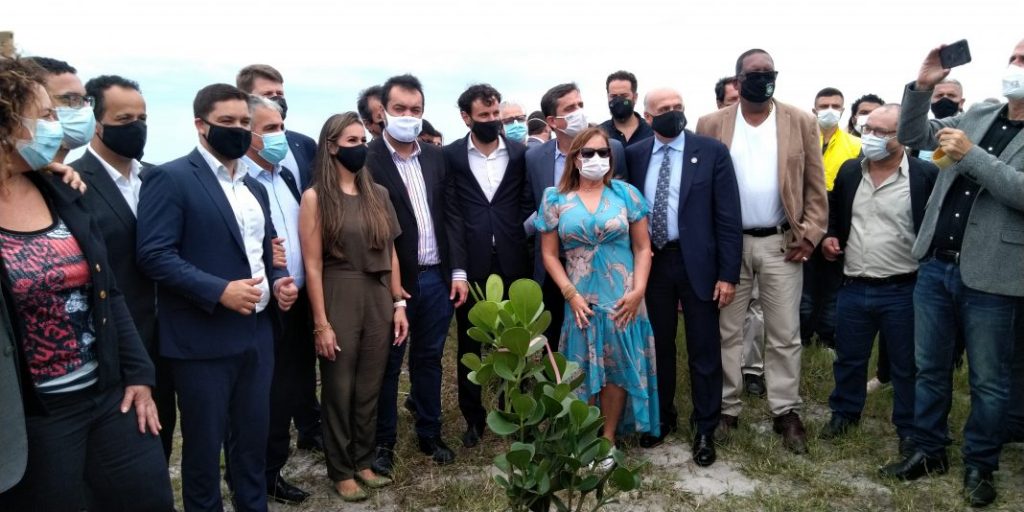MARAEY IS DECLARED A PROJECT OF STRATEGIC INTEREST
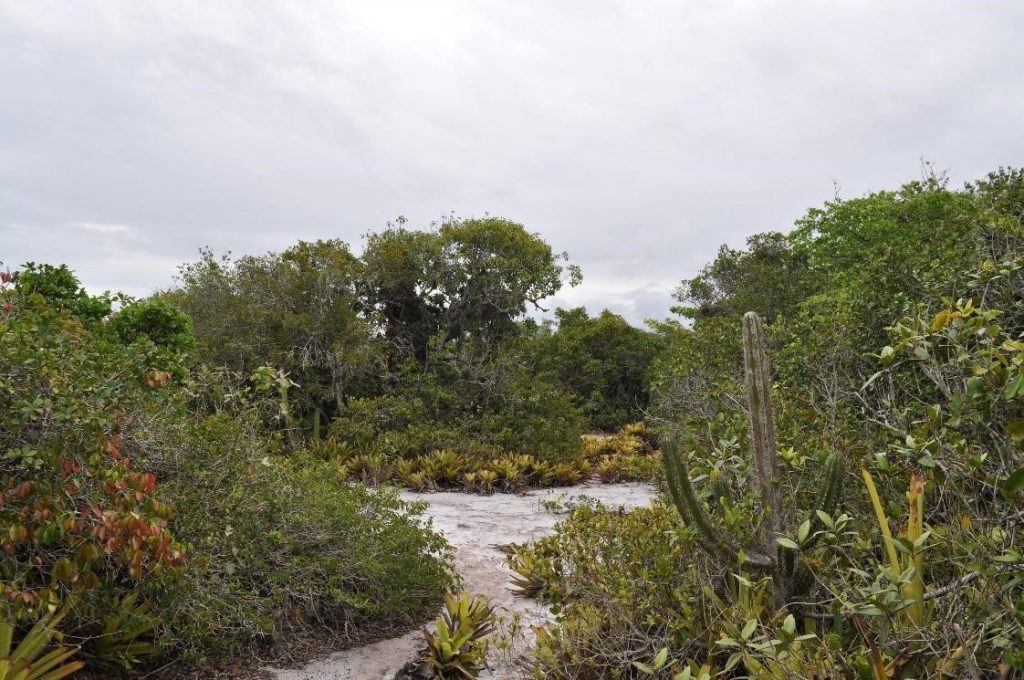
MARAEY, the most important sustainable tourism-residential development in Brazil, is the first project to earn the seal of approval as a strategic undertaking for the state of Rio de Janeiro. The concession of the title took place within the framework of the new Environmental License System and other Control Procedures (Selca), launched in August last year by the State Government, with the aim of de-bureaucratizing and streamlining environmental licenses without losing rigor in the environmental feasibility analysis.
Selca was built with the participation of technicians from the State Institute of the Environment (Inea), representatives of the State and Federal Public Ministry, the Brazilian Institute of Environment and Renewable Natural Resources (Ibama) and the Federation of Industries of the state of Rio de Janeiro (Firjan), among other entities. A public consultation was also carried out that received 384 contributions, of which 124 were used.
The CEO of Maray, Emilio Izquierdo, held the recognition as a strategic entrepreneurship. For him, the decision ratifies the sustainability parameters that had already been recognized outside of Brazil:
The seal of approval as a strategic entrepreneurship is an important asset for the sustainable development of Rio de Janeiro, and it brings security and agility for the State to assume the prominence of a new development model. The Maray project, fully framed within these new values, will contribute to an important transformation of the territory, with proposals focused on social and environmental responsibility, as well as fostering economic growth.
For Nicola Miccione, Secretary of State for the Civil House, the new Licensing System and the granting of the title of strategic entrepreneurship to MARAEY represent the commitment assumed by the government for the resumption of growth:
The new licensing system defines a strategic undertaking as one that generates a positive environmental impact, with the capacity to create jobs, boost the economy, integrate the local population, increase tax collection in the state of Rio and improve public infrastructure. The environmental body will prioritize the processing of environmental license processes for projects covered by this classification.
The MARAEY project was conceived based on high sustainability standards.
In the environmental area, it will create assets such as the second largest Private Reserve of Natural Heritage (RPPN) of restinga in the state of Rio (and fifth largest in Brazil) and an academic research center to deepen the knowledge of the ecosystems of the region. The project will preserve 81% of the total area, with a building occupation of just 6.6%. The native vegetation recovery program will mean an increase of more than 120 hectares of restinga, compared to the previous situation.
As for the social aspect, among other actions, MARAEY will promote the cadastral regularization of Zacarias, with definitive transfer of property titles, through agreements signed with the Maricá City Council, for the 200 families of the fishing community. The company IDB Brasil, responsible for the undertaking, has already signed agreements and collaborations with the aim of creating conditions to prioritize the hiring of local labour.
The economic impact is significant for the entire state. It has four five-star hotels, a luxury residential area, a Hotel Management and Haute Cuisine University, a hospital and school of excellence, sports centers and a shopping center, in addition to various other services. The planned private investment is around 11 billion dollars, with a tax collection of 7.2 billion dollars during the first 14 years (construction and sales consolidation) and more than 1 billion dollars per year in operation. . The forecast is to generate more than 50 thousand in the construction phase and 36 thousand in full operation.
The executive director of MARAEY, David Galipienzo, thanks the seal of approval granted by the state and guarantees that the project will be very positive:
MARAEY Y BMW GROUP BRASIL ENCOURAGE THE USE OF ELECTRIC AND HYBRID VEHICLES
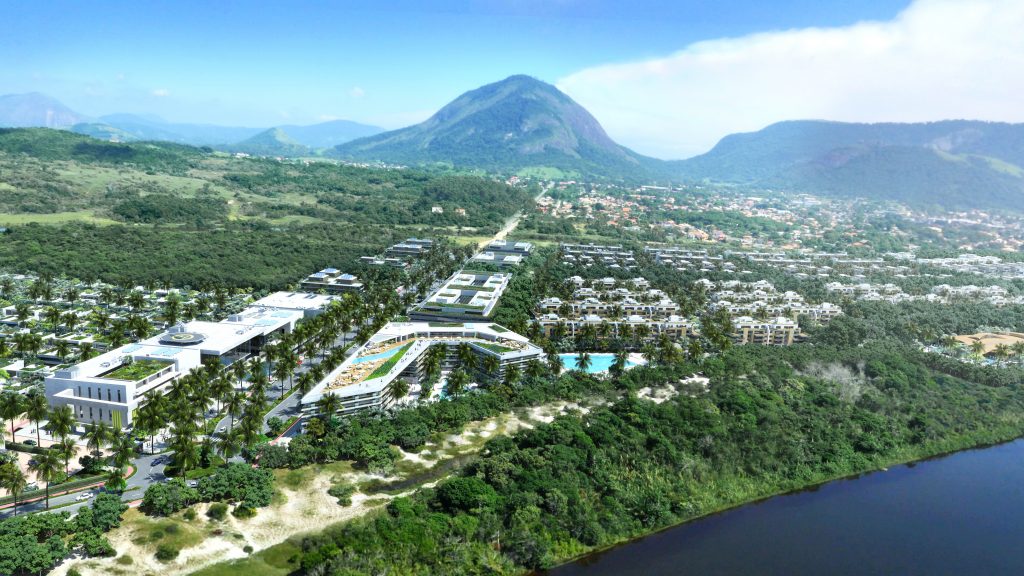
MARAEY, the main sustainable tourism-residential development in Brazil, has just achieved an important boost for clean energy. The CEO of the company responsible for the project, Emilio Izquierdo, and the CEO and president of BMW Group Brazil, Aksel Krieger, signed a contract to promote and prioritize the use of hybrid and electric vehicles in the new neighborhood formed by the development 45 km from the Center of Rio de Janeiro, in the municipality of Maricá. The two companies consider the agreement as an innovative experience of sustainable mobility in the real estate development of an important region of the State.
In an area of 840 hectares, of which more than half will be a Private Reserve of Natural Heritage (RPPN), the inhabitants of MARAEY will have hospital, school, university, shopping centres, proximity stores and offices. In this sense, the forecast of a fleet of 8,000 sustainable cars is in line with the values of the project.
The agreement fulfils MARAEY’s purpose of achieving the 17 Sustainable Development Goals in Brazil. In this case, with objective 11, which provides for Sustainable Cities and Communities, with regard to reducing the negative environmental impact per capita of cities, including paying special attention to air quality.
During the 3-year duration of the agreement, with the consent of the dealers, there is the possibility of acquiring, at a special price, BMW brand cars that offer minimal environmental impact, to customers who buy residential units in MARAEY, a complex that construction will begin in the first half of 2022 and that has sustainable mobility as one of its priorities.
One of the differential points of the agreement with BMW Group Brazil implies that the first 1,200 residents who acquire hybrid or electric vehicles of the brand will have the free installation of the Wallbox – BMW equipment that allows the intelligent charging of an electric car, as simple as charging a smartphone. MARAEY’s objective is that at least 55% of the fleet circulating in the complex be electric or hybrid vehicles; To do this, the project has an infrastructure to charge vehicles powered by electricity throughout its territory. The installation of the Wallbox must be paid for by the purchaser.
To supply the vehicles, MARAEY will set up recharging stations in parking spaces, both in public accesses, at different points, and in all residential areas.
Another MARAEY sustainable resource related to the promotion of “clean” vehicles will be the use of renewable energy sources. With very low levels of dangerous gas emissions, the alternative sources foreseen in the project, such as solar, bio-gas, geothermal and wind power, will also support the charging of electric vehicles in common areas. The estimate, when the complex is fully operational, is more than 8 thousand vehicles between hybrids and electric circulating through it.
Sustainable stamps and international recognition award
MARAEY’s ecological commitment has received international recognition. The undertaking was the first private initiative tourist destination in the world to obtain the BIOSPHERE certification in the category of “Sustainable Tourist Destination”, granted by the Responsible Tourism Institute (RTI), an organization that has a Memorandum of Understanding with UNESCO. With the certification, the project reinforces the commitment to develop in line with the 17 Sustainable Development Goals (SDG) of the United Nations and the most recent guidelines of the Paris Climate Conference.
The development has also received the 2021 USGBC Leadership Award for Latin America and is the first mixed-use project in South America to receive the Sustainable SITES Initiative pre-certification in the GOLD category. Administered by Green Business Certification Inc., SITES is the most internationally recognized certification system in the development of sustainable communities and, among the criteria evaluated by the seal, MARAEY received credits for the use of renewable energy sources, water reuse systems, sustainable mobility, preservation of native fauna and flora, waste management plan and creation of a RPPN, which will be the second largest in the state and fifth largest in Brazil, with 440 hectares – more than half the area of the development.
About MARAEY
MARAEY will be developed on the Costa del Sol, in Maricá. In its tourist branch, the undertaking will have four five-star hotels, which will receive an average of 300,000 tourists per year. The project, which will have a Smart City philosophy, will offer new housing of different types with integrated services such as a school, a hospital, an international hotel university, a shopping center and offices, as well as numerous leisure and sports activities.
With a buildable occupation of just 6.6% of the land, within the 840 hectares of the development, the second largest Private Reserve of Natural Heritage (RPPN) of restinga in the state of Rio will be created. And the almost 200 fishing families who live in The community of Zacarias will benefit from cadastral regularization, urbanization, with the same quality standards as the rest of the project, and by promoting local culture and artisanal fishing.
The planned private investment is around 11 billion dollars, with a tax collection of 7.2 billion dollars during the first 14 years (construction and consolidation of sales) and more than 1 billion dollars per year in operation, with the generation of 36 thousand jobs, when MARAEY is fully operational.
MARAEY AND MARICÁ CITY COUNCIL SIGN AN AGREEMENT TO HIRE LOCAL LABOR IN THE SUSTAINABLE TOURIST-RESIDENTIAL COMPLEX

The executive director of the MARAEY tourist-residential complex, David Galipienzo, and the mayor of Maricá, Fabiano Horta, accompanied by the director of Sustainability of the enterprise, Luciana Andrade, signed this Thursday (25), at the Expo Maricá 2021 event, an agreement of great socioeconomic impact for the municipality. The document provides for the hiring of local construction workers both in the construction and in the operation of the undertaking. Works are scheduled to start this year.
According to the economic impact study developed by the company, during the construction of MARAEY, more than 50,000 jobs will be generated and, when it is fully operational, the offer will be 36,000 jobs. It is also estimated that the project will generate more than 1 billion dollars in taxes per year.
The project will decisively contribute to the creation of new and better employment opportunities in the municipality. The undertaking, in collaboration with the Maricá City Council, will increase the local labor market, encouraging and participating in the creation of new employment opportunities, including agreements with private initiatives and professional training policies together with qualified institutions. The mayor of Maricá celebrated the fact that the signing took place at Expo Maricá, an event that brings together the best businessmen for the benefit of the municipality.
Galipienzo sees the agreement as the beginning of a strategic alliance that will contribute to the transformation of the city: “EIt is important to say that MARAEY is Maricá. This agreement is one of the many commitments that the company has proposed to assume in the coming years with the municipality and, above all, with the population of Maricá. We are going to work together for an increasingly prosperous and sustainable future for the city.”
Luciana Andrade explains what the priority hiring process for local labour will be like. “The locals of Maricá will be an absolute priority in the project to fill the positions. We will work side by side with the municipality in this process of hiring local professionals. The City Council will be responsible for selecting professionals according to the profiles of each one, through the Secretaries of Labour and Economic Development. The companies that provide products and services, located in Maricá, will also have preference at the time of hiring”, explained the director.
It is also important to remember that, in order to train the population of Maricá, MARAEY and the Maricá City Council have already signed agreements with some renowned institutions such as Senac RJ. In the area of tourism and gastronomy, two actions are already planned: a technical training centre, in collaboration between MARAEY and the City Council, and a hotel and haute cuisine university within the enterprise.
The Maricá City Council will also invest in the construcion of training and professional development centres in the area of civil construction and work safety, among others. Some of the courses contemplated for the construction phase will be: site manager, bricklayer, carpenter, plumber, electrician, painter, cabinetmaker, hardware supplier, safety and environmental technicians to name but a few.
In order to encourage the employees of the construction period to make a transition to the operation phase of the undertaking, MARAEY will develop a continuous training program. Over the years, it is planned to train employees through different courses, so that they can occupy future positions offered by the enterprise, in areas related to the main activities of the project, such as hotels, tourism, commerce, education, health, gastronomy, leisure and sports.
FUNDAMENTAL TREE: THE EVENT IS A HISTORIC MILESTONE FOR MARAEY, THE MOST IMPORTANT SUSTAINABLE TOURISM-REAL ESTATE PROJECT IN THE COUNTRY, WICH PROMISES TO PROMOTE THE DEVELOPMENT OF MARICÁ AND THE STATE OF RIO
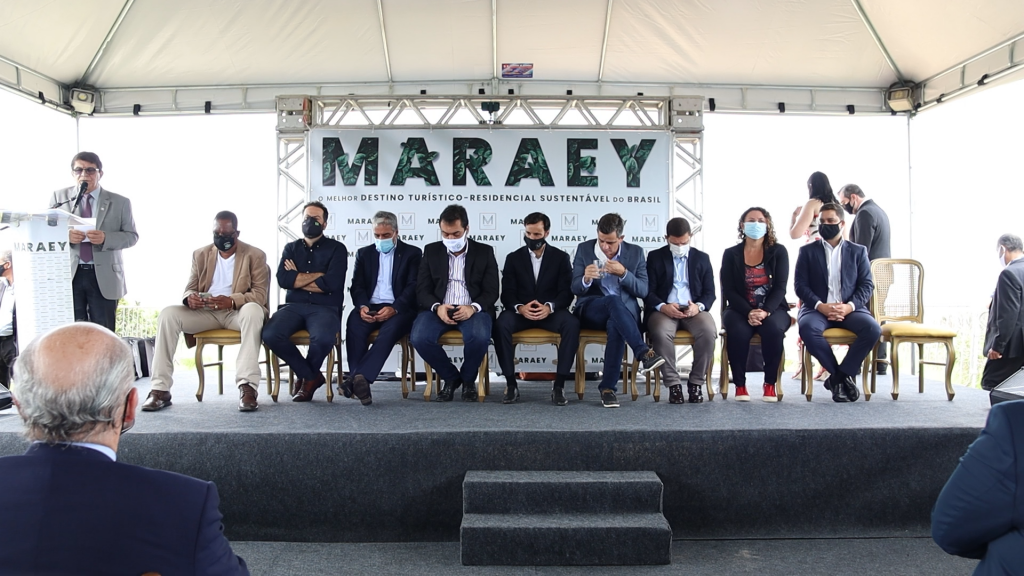
The launch of MARAEY became a reality this Thursday (28). At the “Fundamental Tree”, event, the executives of the main sustainable tourism-real estate project in the country welcomed the governor of the state of Rio de Janeiro, Cláudio Castro, the mayor of Maricá, Fabiano Horta, and the executive secretary for the Ministry of Tourism, Daniel Nepomuceno, among other authorities. The idea is to celebrate the historical milestone of the authorization for the construction project. With the start of the works scheduled for the end of the year, MARAEY promises to decisively promote sustainable tourism in the state of Rio de Janeiro and the municipality of Maricá.
The meeting, which was held in the branch of entrepreneurship, in Maricá, brought together authorities from the federal, state and municipal levels, in addition to the project leaders. Along with the executives Emilio Izquierdo Merlo (CEO of MARAEY), David Galipienzo (executive director) and Luciana Andrade (sustainability director), the president of the Legislative Assembly of the state of Rio de Janeiro (Alerj), André Ceciliano; the president of the Municipal Chamber of Maricá, Aldair de Linda; the secretary of Environment and Sustainability of the state of Rio, Thiago Pampolha; the state deputy, Zeidan, and the president of the State Institute for the Environment (Inea), Philipe Campello. The mediation of the authorities’ speeches was carried out by the president of the Federal Council of Real Estate Agents (COFECI), João Teodoro da Silva.
The CEO of MARAEY, Emilio Izquierdo Merlo, gave the dimension of this historical milestone. “This is a fundamental day. MARAEY holds the script to truly become the best and most important sustainable tourism-residential destination in Brazil, through respect for the environment and local culture, significant economic investments and the creation of thousands of jobs, especially linked to tourism.”
In addition to MARAEY executives, the project’s creators, Emilio Izquierdo Jiménez and Kiko Senosiáin, and representatives of IDB Brasil’s member companies, Abacus Property Development and Grupo Cetya, also attended the event.
The governor of the state of Rio de Janeiro, Cláudio Castro, highlighted the importance of the alliance between the state and the entrepreneur for sustainable development: “It is an enormous privilage to be here. It is an honour to be able to come to Maricá. We are here to work for our population. Nobody does anything alone. Regardless of the political and partisan flag, we want to work together. MARAEY could have chosen another place in the world, but we chose Maricá”.
The mayor of Maricá, Fabiano Horta highlighted the symbolism of the event: “Today is a day of great satisfaction. Major events require symbolic milestones. Today we are going to plant a tree in honor of the city and I want to reaffirm Maricá’s commitment to the dialogue between the public and the private sectors.”. Horta also highlighted the importance of the Zacarias community in building dialogue between MARAEY and the local population. “This dialogue is imperative, but without imposing itself on a population that is connected to the enterprise. Zacarias is part of Maricá’s history and will be an integral part of the project”.
The Executive Secretary of the Ministry of Tourism, Daniel Nepomuceno, listed the courage, resilience and entrepreneurial spirit of the MARAEY team: “It is with immense pride, we receive entrepreneurs to invest in this echelon of tourism. We have the duty and obligation to support the entrepreneur. We are proud that MARAEY brings the Zacarias community and entrepreneurship to the world. This is just the beginning of everything. We have a lot of work ahead of us. Rio de Janeiro is a world heritage site. It deserves the effort, attention and entrepreneurship and the whole team to be working on it”.
TThiago Pampolha, State Secretary for the Environment and Sustainability, spoke about the qualities of the project: “Today is a happy day, a day to celebrate work, technique, and union. A government that believes in the workforce and in the development of our state. The undertaking is located in a protected area of sustainable use, but has demonstrated the ability to make the best dialogue, respecting the environment, natural beauty, enhancing this heritage”.
THE FUNDAMENTAL TREE OF MARAEY
To symbolize the ceremony, the executives and some authorities planted a tree of the Clusia fluminensis species on the development’s land. Galipienzo explained the choice: “the “Clusia fluminensis” species on the development’s land. Galipienzo explained the choice: “We mark the beginning of the MARAEY project with the planting of a fundamental tree, which symbolizes our total commitment to the environment. The chosen species is a declared tribute to the natural heritage of the state, in addition to being a very important tree, one of the precursors of the restinga ecosystem. It adapts well to the area. It is a beautiful and significant tree”, explained David Galipienzo.
In his opening speech, Emilio Izquierdo made reference to the partners of the project, such as Rock in Rio – which will have a hotel designed to be the best all-inclusive themed resort in the world on the beachfront – and to the family of tennis player Maria Esther Bueno, which will be honoured with the Maria Esther Bueno Tennis & Sports Club, a sports centre with eight tennis courts that will have part of the income destined for social projects to promote actions in Maricá and surroundings.
Emilio also highlighted the three pillars that support the project. “We are guided by the three authentic and non-negotiable principles that guide our endeavour and are part of the DNA of all those who participate in it: environmental commitment, social responsibility and economic development”.
THE RPPN WILL BE PRESERVED “AS IF IT WERE A NATIONAL PARK”
From an environmental point of view, the development will have only 6.6% building occupancy (half of that allowed by the Management Plan), in addition to preserving and improving the Maricá Environmental Protection Area (APA), through the creation of the second largest Private Reserve of Restinga Natural Heritage in the state of Rio, and fifth in Brazil.
MARAEY will also create, in the first phase of the project, an environmental research center – with the support of some of the most renowned universities in Brazil, such as UFRJ, UFF, UFRRJ, UFES and FURG – that will implement a monitoring program, as well as various scientific studies. , to better understand the ecology of endemic and threatened species in local ecosystems.
PROPERTY TITLES FOR ZACARÍAS: “WE WILL RESCUE ARTISANAL FISHING”
In its social side, the almost 200 families that live in the community of Zacarías, within the development area, will benefit from the cadastral regularization, with the transfer of the property title and delivery of the definitive deed to the residents. MARAEY will also encourage local culture and fishing with programs for the recovery of the Maricá Lagoon, repopulation of native species, and the rescue and dissemination of the family memory of Zacarías, through the creation of the Casa del Pescador Artesanal.
MARAEY has already signed agreements, of great socioeconomic impact for the municipality, with some renowned institutions such as Senac RJ, in addition to the Maricá City Council itself and Codemar. The protocols of intent provide for professional education and training for the use of local labour for the construction and operation phases of the enterprise, as well as in other businesses.
BOOST THE ECONOMY: “INVESTMENTS, GENERATION OF TAXES AND MORE JOBS DURING CONSTRUCTION”
The project also incorporates four five-star hotels, which will receive an average of 300,000 tourists per year: a luxurious eco-boutique hotel, a luxury themed resort (of the Rock in Rio brand), another designed to be the convention hotel in the most emblematic seafront in the country and the MARAEY Golf Resort, around an 18-hole international-level sustainable golf course.
With a Smart City philosophy, that is, with an extensive implementation of Information and Communication technologies, the project plans new homes of different types -focused on quality, design and energy efficiency- with integrated services such as education, health, commerce, sports , leisure and business. “Between the construction and the consolidation of sales, the project – which will have more than 11 billion dollars of private investment which will boost the economy of the state for the next 14 years and will generate more than 50 thousand jobs” , concludes, Left. When fully operational, MARAEY will generate more than 1 billion dollars in taxes per year and 36 thousand jobs.
MARAEY INITIATES THE PROCESS FOR THE CREATION OF THE RPPN IN INEA
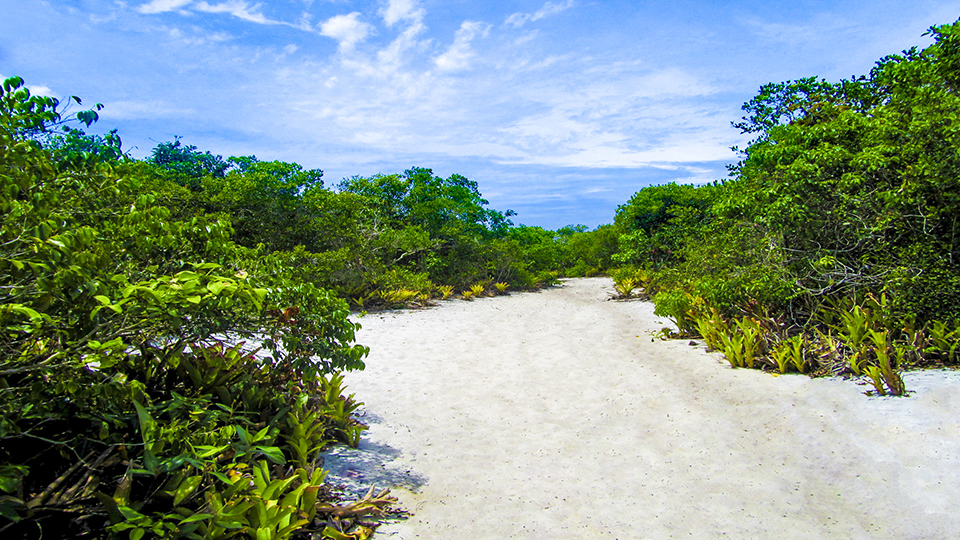
MARAEY, the biggest sustainable tourism-real estate development in Brazil, built in Maricá, began together with the State Institute of the Environment (Inea) in the process of creating the Private Reserve of Natural Heritage (RPPN), committed to the first phase of the project whose works will begin this very year. With 440 hectares, which correspond to more than half of the development area, the RPPN will be the second largest in the state of Rio de Janeiro and the fifth largest in Brazil, with the guarantee of comprehensive and perpetual protection of the local ecosystem.
Once the project begins, MARAEY will also begin work to recover another 165 hectares of native restinga vegetation therefore expanding the area of preserved vegetation in relation to the situation prior to the project. The protection of this large extension, the conservation of the fauna and flora of the Maricá restinga, the preservation programs, management and monitoring programs, together with the creation of a nursery for the production of cuttings of native vegetation. This will guarantee the preservation of the endangered species that live in the Environmental Protection Area (APA) of Maricá.
With a building occupation of just 6.6% of the land which is half the limit allowed by the Management Plan decreed for the region. MARAEY promises to go further and, for that, it will have various environmental programs to carry out research on protected species of the APA, as well as recovery and reforestation of currently degraded areas within the APA.
The executive director of MARAEY, David Galipienzo, explains the project’s academic agreements with the Environmental Reference Center (CRA): “It is important to note that, in addition to the RPPN, also in this first phase of the project, we will create an environmental research center -with the support of the most recognized universities in Brazil, such as UFRJ, UFF, UFRRJ, UFES and FURG- that will implement a monitoring program as well as various scientific studies, to better understand the ecology of the endemic and/or endangered species of the APA ”.
With more than 800 animal species -including 67 types of mammals, 223 birds, 61 reptiles and amphibians, 368 insects and 84 aquatic species- in addition to 522 different species of flora, the conservation unit will be open to the public. “MARAEY has always had absolute respect for biodiversity and for the conservation of the APA and in turn the designed MARAEY project always respecting the APA zoning. Also prioritizing the conservation of the best preserved areas. As an example, after the environmental diagnostic studies of the APA for the EIA/RIMA, the company adapted the project to avoid the occupation of flooded areas, dunes and arboreal restinga areas”, concludes the executive.
MARAEY WINS THE 2021 LEADERSHIP AWARD FOR LATIN AMERICA GRANTED BY THE U.S. GREEN BUILDING COUNCIL
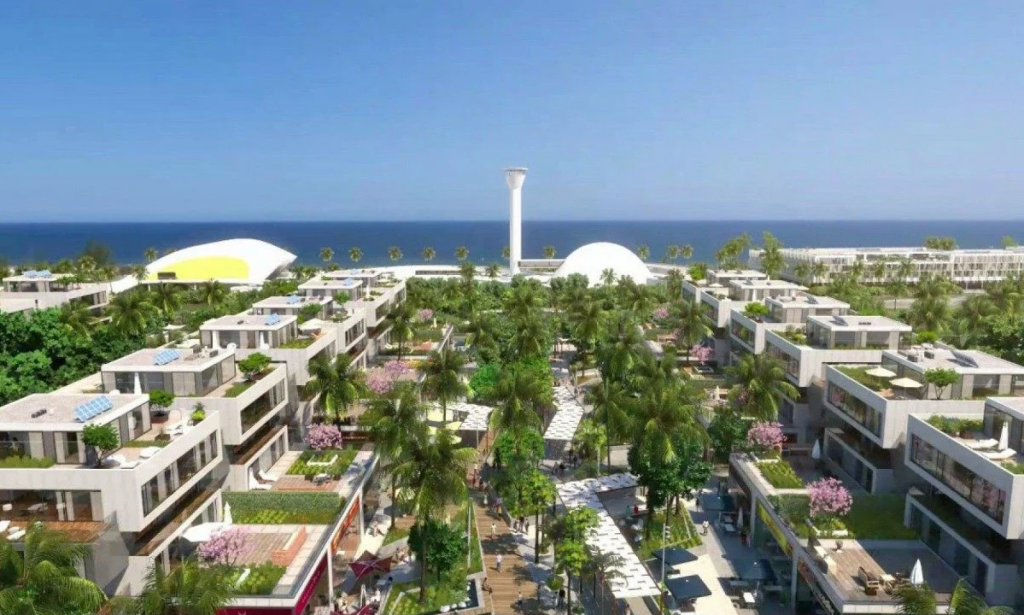
MARAEY, the main sustainable tourist-residential development in Brazil, to be built in Maricá, has just claimed the U.S. Green Building Council 2021 USGBC Leadership Award Latin America. The project was praised for the high score it obtained by achieving precertification from the Sustainable SITES Initiative® (SITES) in the GOLD category, making it the first pre-certified mixed-use project in all of South America.
“It is a huge honour for us to win such an important award granted by the U.S. Green Building Council, the world’s top certifying body for sustainable communities and buildings, thanks to LEED and SITES certifications. This is a historical framework that bolsters our core principles and values geared towards environmental protection, inclusion of the area’s communities, and sustainable economic development,” says Emilio Izquierdo, CEO of the initiative.
Mr Izquierdo also pointed out that, along with other milestones, the MARAEY team will be delivering a ground-breaking project.
El premio The USGBC Leadership Award The USGBC Leadership Award goes to outstanding projects and companies on the road to sustainability and so-called eco-friendly buildings. The award winners, who were announced during the USGBC Live opening event, are raising the bar in terms of enterprising projects and making communities more sustainable, healthy and resilient.
In MARAEY, for instance, using renewables was one of the key criteria considered when rating the project for SITES precertification. More than half of the electricity to be consumed in this vast project will be produced using renewable sources such as solar power, biogas and wind energy.
“This award acknowledges what MARAEY has achieved by becoming the first project to get SITES Gold precertification in the region. The way the undertaking is designed is proof of the team’s commitment to creating a sustainable and resilient experience that is good for the community,” explains Mahesh Ramanujam, CEO and Chairman of the U.S. Green Building Council. “We believe that healthy people in healthy places lead to a healthy economy. Through the leadership of projects like MARAEY, we know that this vision can become a global reality. It will be an honour and a privilege to keep up our leadership in order to move forward in our collective mission to shape a sustainable future for all,” added Mr Ramanujam.
Perpetual preservation of a 440-hectare Private Restinga Reserve
Building on just 6.6% of land, MARAEY intends to preserve 81% of the project’s overall surface area and create the second-largest Private Natural Heritage Reserve (RPPN) of restinga forest in the State of Rio de Janeiro and the fifth in Brazil. Covering nearly 440 hectares, the RPPN will span almost half of the overall surface of MARAEY and will be fully and perpetually protected.
Another resource used to preserve wildlife is the degraded area environmental recovery programme, as well as a plan to rescue endangered species in a nursery. Following the project’s implementation, it is estimated that native vegetation will be restored in over 120 hectares of restinga forest compared to the situation prior to MARAEY.
55% of vehicles driven in the development aim to be electric or hybrid
The project’s values also include promoting the use of sustainable vehicles. The aim is for at least 55% of the fleet driven around the complex to be electric or hybrid vehicles. This will involve setting up an electric vehicle charging infrastructure across the entire complex. MARAEY will also feature the longest cycle lane in any private real estate development in Brazil, measuring 20 km long and joining up to the Maricá network to total 57.5 km altogether.
A smart city with various types of new houses
The undertaking plans to feature a variety of dwellings: apartment blocks, duplex homes and villas. Residents will enjoy homes built according to the highest quality and design standards, with vast recreational areas and the finest health, education, sports, leisure and business services. The project also ensures top-level security everywhere, including the local community of Zacarias.
MARAEY believes in the smart city philosophy, which means widespread implementation of information and communication technologies. Smart buildings and initiatives fostering a responsible use of natural resources help make a minimal impact on the environment. The local transport system will rely on electric models to keep CO2 emissions to a minimum. Plus, the complex will boast a series of electrical connection points, smart and eco-friendly lighting, bio-based materials, dynamic façades and green roofs.
About USGBC Leadership Award
The USGBC Leadership Awards presented by USGBC Live reward exemplary leadership shown in the past year by individuals and organisations who support ecological construction around the globe. The awards also acknowledge where hard work is done to create healthy and sustainable spaces.
USGBC Live is a new event combining the expertise of the largest community of leaders in ecological construction with data, know-how, stories and leadership from thousands of LEED projects (*) and sustainable initiatives worldwide. The aim is to spark relevant debates regarding the future of buildings, cities and communities. This three-day virtual event featured different content channels located in various regions in Europe and abroad hosting debates on innovative ways of promoting industry.
(*) LEED is a certification system for sustainable buildings developed by the non-government organisation United States Green Building Council in an effort to promote and foster sustainable construction practices in compliance with eco-friendly building criteria.
About Sustainable SITES Initiative® (SITES)
Sustainable SITES Initiative® or simply SITES® certification is managed by Green Business Certification Inc. (GBCI) and consists in the most comprehensive programme for designing, developing and maintaining sustainable environments.
The SITES credits system promotes best practice in ecological restoration, landscape architecture and other similar areas. The programme supports and restores the functions of healthy ecosystems, both in urban and rural areas. From plants and soils to water and materials, SITES improves communities through responsible design, enhancing the functions of buildings by means of affordable and environmentally-friendly solutions and creating a strong link between people and nature. SITES connects design with ecology and people with places.
SITES was developed through the collaborative and interdisciplinary efforts of the American Society of Landscape Architects, the University of Texas’ Lady Bird Johnson Wildflower Center in Austin and the United States Botanic Garden.
About MARAEY
The tourist side of the undertaking will house four five-star hotels welcoming an average 300 thousand tourists per year: a magnificent eco-boutique resort, a luxury themed resort, a hotel designed to be the country’s most iconic seaside events venue, and MARAEY Golf Resort surrounding an internationally certified 18-hole golf course.
MARAEY is the world’s first private initiative to receive the BIOSPHERE seal in the “Sustainable Tourist Destination” category granted by the Responsible Tourism Institute (RTI), an organisation that emerged from a UNESCO memorandum of understanding. This certification furthers the project’s commitment to align with the 17 United Nations Sustainable Development Goals (SDGs) and the latest directives of the Paris Climate Agreement.
The development is also the first mixed-use complex in South America to achieve precertification from the Sustainable SITES Initiative in the GOLD category. Managed by Green Business Certification Inc., SITES is the world’s most widely recognised seal for the development of sustainable communities. Out of the criteria assessed, MARAEY earned credits for factors such as using renewable energy sources, water repurposing systems, sustainable mobility, preservation of native flora and fauna, and creation of an RPPN.
The project also plans to set up the María Esther Bueno Tennis & Sports Club, housing eight tennis courts including clay, grass and fast courts, making it the only sports club in Brazil to offer all three kinds found in the major international tournaments. Part of its revenue will go to social projects to drive social action in the surrounding municipalities through sport and education. MARAEY also includes an international hospitality university, making Maricá a hub for specialized training in Latin America.
The private investment forecast for the project is in order of R$ 11 billion, expecting R$ 7.2 billion to be collected in tax over the first 14 years (construction and consolidation of sales), followed by over R$ 1 billion per year once fully up and running. The economy of the State of Rio is predicted to warm up as 36 thousand jobs are created once MARAEY is in full operation.
There are around 200 fishing families living in the Zacarias community inside the area of the project who stand to gain from legalised land use and being given deeds of official ownership and residence. MARAEY will also foster the local culture and fishing with programmes to restore the Maricá Lagoon, recover native species, and bring back and raise awareness of the Zacarias family memory by creating the Craft Fisherman’s House.
MARAEY TO INVEST R$ 1 BILLION IN THE MARAEY EESG AGENDA 2030
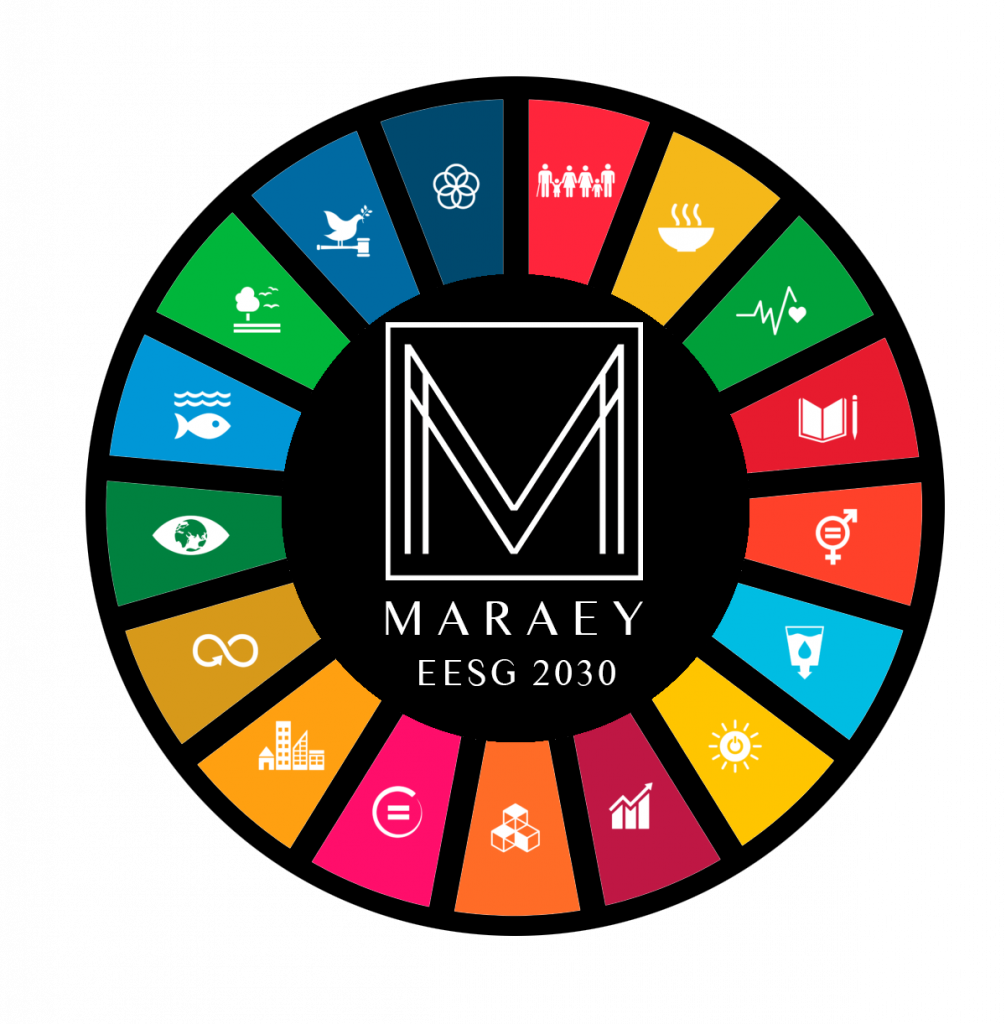
A benchmark for sustainability, the project pledges to achieve the best economic, environmental, social responsibility and governance indicators
MARAEY, a sustainability benchmark to be developed in Maricá, has announced the creation of its MARAEY EESG 2030 Agenda, with investments in order of R$ 1 billion over the next nine years, which accounts for approximately 10% of the project’s overall investment. Despite a recent court ruling which affects progress to achieve the licence for the project, MARAEY’s executives are confident in the final decision and have confirmed that they will take all legitimate legal action to get the licence and bring MARAEY to fruition, relying on the Judicial Power to authorise the implementation of a project that represents a benchmark in terms of sustainability, with a positive impact on the population of the State of Rio de Janeiro.
Embracing the EESG 2030 agenda is one of the areas it is progressing towards, with a timeline of priority actions to address a combination of economic (E), environmental (E), social responsibility (S) and governance (G) indicators. Work is set to begin once the Installation Licence is issued for the project by the State Environmental Institute (INEA).
“IDB Brasil, the company in charge of MARAEY, and our entire team are working to resume the licence application process as soon as possible. It is our mission to deliver a unique and innovative project to Maricá that will drive progress not only in this eastern Brazilian region, but all across the State of Rio de Janeiro,” says Emilio Izquierdo, CEO of MARAEY.
The undertaking, which has already been awarded internationally recognised seals such as BIOSPHERE and Sustainable SITES Initiative GOLD precertification, has joined the United Nationals Global Compact, confirming its commitment to work towards the global sustainability agenda in line with the international initiative’s 17 Sustainable Development Goals (SDGs) set for 2030.
Emilio Izquierdo argues that it is urgent to invest in EESG, which reinforces the MARAEY mission: “By materialising this project, we aim to champion the EESG debate in tourist-residential undertakings because we are a benchmark for environmental sustainability. MARAEY will also have a hugely positive impact on economic and social aspects, with significant investments, job creation, training and hiring local manpower, as well as legalising property and granting deeds of ownership for members of the Zacarias fishing community. And we also intend to move forward by investing in a clear agenda for governance indicators,” explains Mr Izquierdo.
MARAEY EESG ACTIONS BY 2030
Efforts towards the MARAEY 2030 Agenda will firmly continue once the infrastructure work begins, with a timeline of constant actions to be comprehensively deployed in EESG areas, ever in connection with the United Nations Sustainable Development Goals (SDGs).
Environment
On the environmental front, special mention goes to the creation of the second-largest Private Natural Heritage Reserve of restinga forest in the State of Rio de Janeiro, covering almost 440 hectares, along with another 249 hectares of restored native vegetation, adding up to a protected environmental area that spans 81% of MARAEY’s 845 hectares.
Another resource used to preserve wildlife is the degraded area environmental recovery programme, as well as a plan to rescue and care for endangered species in a nursery. Once the programme is implemented, it is estimated that native vegetation will be restored in over 120 hectares of restinga forest compared to the situation prior to MARAEY.
Other initiatives in the pipeline include building a system to catch and use rainwater, treating waste water from the complex using tertiary technology which transforms effluents into reusable water, and producing part of the project’s energy demands from renewable energy sources such as solar, wind, geothermal and biomass.
MARAEY will also be laying a 20 km bike lane, the longest in any private real estate development in Brazil, which will link up to Maricá’s cycling network, as well as implementing policies and subsidies to make the vehicles in the undertaking mostly hybrid or electric.
These actions are aligned with five SDGs:
SDG 6 (clean water and sanitation) – treating waste water promotes the circular economy by turning it into an asset as reusable water.
SDG 7 (Affordable and clean energy) – more than half of the power consumed in MARAEY’s outdoor areas will be generated by renewable sources.
SDG 13 (Climate action), fostering environmental protection and the ability to capture CO2.
SDG 14 (Life below water) – with programmes to recover the Maricá Lagoon, restore native species and rescue craft fishing.
SDG 15 (Life on land) – carrying out Basic Environmental Plans to preserve over 800 species of animals and 522 types of plants.
SDG 17 (Partnerships for the goals) – setting up an academic research centre focussing on the ecosystem in collaboration with some of the country’s top universities.
Social responsibility
In social terms, some of the most significant contributions include legalising deeds of ownership for the Zacarias community, urbanising land with the same infrastructure as the rest of the undertaking, and creating support programmes to revitalise craft fishing and restore the local culture, as well as treating waste water using tertiary technology for all residents to turn effluents into reusable water.
“The Zacarias community is one of the project’s greatest values. Nearly 200 families living in the MARAEY area stand to gain from receiving official deeds of ownership for their properties. It is also our goal to foster the local culture and fishing with programmes to restore the Maricá Lagoon, recover native species, and bring back and raise awareness of the Zacarias family memory by creating the Craft Fisherman’s House,” explains Luciana Andrade, the project’s Director of Sustainability.
These actions will also have a positive impact on the quality of the Maricá Lagoon, providing fishermen with a broader and better consumption market. Furthermore, up to 0.7% of the project’s overall revenue will go to the MARAEY Institute to be invested in environmental protection, training and equality programmes.
MARAEY is also embracing its social-cultural commitment by ensuring high-quality, inclusive and equitable education, the kind that underpins values such as biodiversity and promotes learning based on principles such as respect for differences and the right to equal opportunities. As well as creating the Hospitality and Haute Cuisine University and the Maricá Training Centre, the initiative also involves educational and qualification collaborations and agreements with the local Council and other specialised institutions.
These social responsibility actions are in line with the following SDGs:
SDG 3 (Good health and well-being) – creating a hospital which will help the community and support research, as well as education and prevention campaigns.
SDG 4 (Quality education) – setting up public-private partnerships to drive professional qualification.
SDG 5 (Gender equality) – creating professional opportunities and development based on equality.
SDG 11 (Sustainable cities and communities) – implementing initiatives for a balanced use of natural resources, new technology in construction processes, energy efficiency and renewables (smart city and eco-mobility).
They are also aligned with publicly-driven SDGs:
SDG 1 (No poverty) – through the action plan to ensure that all people have the same rights to economic resources and access to fundamental services.
SDG 2 (Zero hunger and sustainable agriculture) – launching social action campaigns conducted by the MARAEY Institute and corporate volunteering to collect food and share it out among vulnerable groups.
SDG 10 (Reduced inequalities) – in an area developed sustainably, efficiently, accessibly, inclusively and with balance.
Governance
The governance agenda – which rests on the basic principles of corporate social responsibility, transparency, integrity, legal compliance and respect for human rights – starts with initiatives such as redefining the MARAEY Board, including specific policies to combat gender inequality, and hiring independent advisers who are separate from the organisation’s management. Setting up the MARAEY Institute will involve launching social action programmes with collaborating companies, subcontractors and providers.
These initial actions are aligned with four SDGs:
SDG 5 (Gender equality) y SDG 10 (Reduced inequalities).
SDG 16 (Peace, justice and strong institutions) – thanks to policies for the prevention of corruption, fraud and bribery and internal control policies.
SDG 17 (Partnerships for the goals) – collaborating with public and private organisations to drive sustainable development.
Economy
In economic terms, MARAEY believes in responsible tourism and in inclusive and sustainable economic growth. The private investment forecast to develop the project is in order of R$ 11 billion, expecting R$ 7.2 billion to be collected in tax over the first 14 years (construction and consolidation of sales), followed by over R$ 1 billion per year once fully up and running. The economy of the State of Rio de Janeiro is predicted to warm up as 36 thousand jobs are created once MARAEY is in full operation.
These steps towards economic progress are aligned with:
SDG 8 (Decent work and economic growth) – ensuring a safe and healthy working environment and protecting labour rights.
SDG 9 (Industry, innovation and infrastructure) – with the project supporting new technologies and research within an ecosystem of leading companies in their fields of work.
SDG 12 (Responsible consumption and production) – focussing on responsible tourism, sustainable consumption and waste management, as well as promoting local produce.
EESG ETCHED INTO THE MARAEY DNA
MARAEY’s Executive Manager, David Galipienzo, highlights the organisation’s current values to underline its future EESG commitments.
MARAEY TO TRANSFORM THE PROJECT´ S WASTE WATER INTO REUSABLE WATER
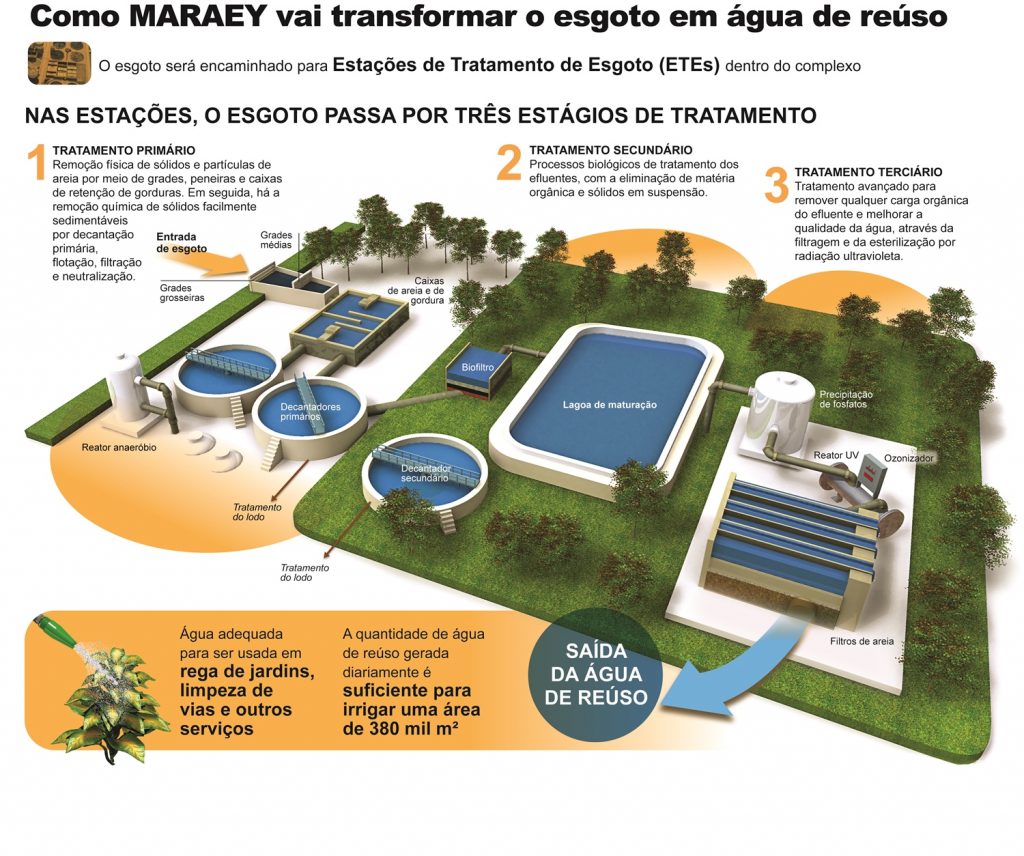
MARAEY, the main sustainable tourist-residential development in Brazil, announced this week that all waste water generated in the complex will be treated using tertiary technology to turn effluents into reusable water for other purposes. The sanitation model, which is considered the most efficient in the country, will make use of this treated water for garden irrigation, roadway cleaning and other essential services. The undertaking, set to be built on the Costa del Sol in Maricá, is close to achieving its Installation Licence from the State Environmental Institute (INEA), which would allow infrastructure work to get underway, including sanitation.
The decision to use tertiary water treatment, which fosters a circular economy by allowing waste water to be repurposed as an asset, is part of a package of measures lined up within the MARAEY EESG Agenda, including various structural initiatives in the fields of economy, environment, social responsibility and governance.
MARAEY’s Executive Manager, David Galipienzo, explains the advantages of this technology.
Waste water from the project will be channelled into Waste Water Treatment Plants (ETEs), where it will undergo several major stages of treatment divided into three phases, producing quality water in better condition than can be found in the Lagoon itself. The first phase consists in physically removing solids, followed by phase two with biological processes to treat the effluents, and ending with phase three, the most advanced, which involves sterilisation through ultraviolet radiation.
Repurposed water will be used to water gardens
MARAEY plans to reuse the water obtained from its waste water treatment plants (ETEs). It is estimated that the amount of waste water repurposed every day once in full operation will average roughly 60 litres per second – enough to irrigate approximately 380 thousand m2. Another sustainable water-related solution in the pipeline involves catching rainwater using a road catchment system and storing it in specific tanks to be used once it has been filtered and sterilised.
About MARAEY
MARAEY is set to be developed on Brazil’s Costal del Sol in Maricá. The tourist side of the undertaking will involve four five-star hotels welcoming an average of 300 thousand tourists every year. The project, guided by the smart city philosophy, will also feature various kinds of homes with a comprehensive range of services such as a school, hospital, international hospitality university, shops and businesses, as well as a host of leisure activities and sports. Having achieved worldwide seals such as BIOSPHERE and SITES GOLD precertification, MARAEY rises as a global benchmark for sustainability, quality and design.
MARAEY will also feature the longest bike lane in any private development in Brazil, measuring 20 km long, and aims for 55% of the fleet of vehicles used in the development to be electric or hybrid.
With barely 6.6% of the undertaking’s 860 hectares of land to be used for construction, it will be home to the second largest Private Natural Heritage Reserve (RPPN) of restinga forest in the State of Rio de Janeiro. As regards the 200 fishing families who live in the local Zacarias community, they stand to gain from seeing their properties legalised and receiving deeds of ownership, as well as an urban planning and infrastructure plan that meets the same standards and services as the rest of the project, and constant support for the local culture and fishing.
The private investment forecast is in order of R$ 11 billion, expecting R$ 7.2 billion to be collected in tax over the first 14 years (construction and consolidation of sales), followed by over R$ 1 billion per year once in operation and 36 thousand new jobs when MARAEY is fully up and running.
HALF OF THE POWER USED IN THE MARAEY TOURIST-RESIDENTIAL COMPLEX COMMON AREAS WILL COME FROM RENEWABLE SOURCES
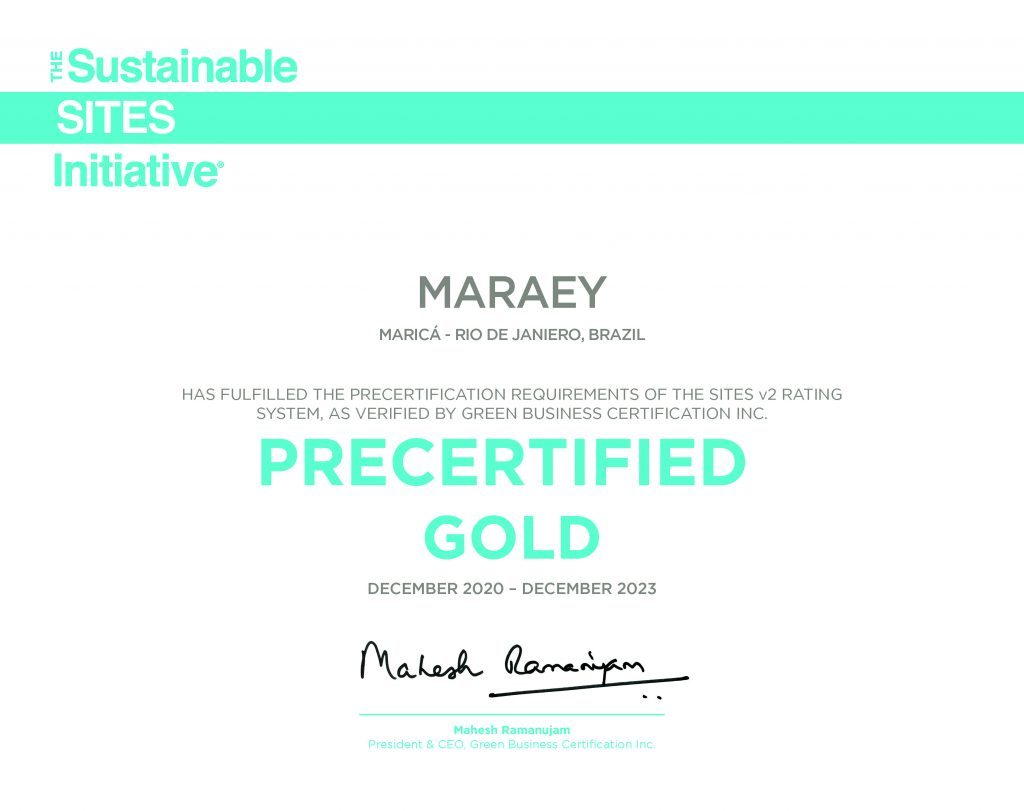
This promise is part of the Gold precertification granted to the project by the Sustainable SITES Initiative® for sustainable environments, making this the only pre-certified mixed-use developoment in South America.
The MARAEY undertaking, which is planned to be built in Maricá on Rio de Janeiro’s Costa del Sol, has just received precertification from SITES (Sustainable SITES Initiative®) in the Gold category. Using renewable energy was one of the key criteria considered when rating the tourist-residential complex for this sustainability seal. More than 50% of the electricity consumed in MARAEY’s outdoor areas will be generated by renewable sources, including solar power, biogas and mini wind energy, serving an estimated population of 70 thousand people including residents, service providers, tourists and workers.
The v2 Credit System uses a 200-point scorecard with four levels of excellence, where SITES Gold is the second-best. SITES is a programme that fosters sustainable environmental development and can be used to boost a project’s sustainability, which includes implementing green infrastructure and enhancing its resilience.
As well as using solar panels, the team of technicians on the project are considering various forms of energy production based on renewables, such as biogas produced from treating waste water and wind power generated by mini turbines. Geothermal energy is another option under study which consists in the process of exchanging heat from the ground and using it in air conditioning systems to help lower electric energy consumption in buildings. The power produced by renewable sources will also be used for lighting in public and common areas within the complex and supplying irrigation systems in the gardens, sports facilities and leisure areas.
“Achieving SITES Gold precertification just goes to show how deeply embedded the concept of sustainability is in the MARAEY project, striving for coherence between what we propose, what we believe and what we offer. We will be the first to be pre-certified in the mixed-use category in all of South America. Out of the greatest tourist-residential undertakings, ours will have a cutting-edge structure in terms of the complexity and variety of sustainable energy sources,” stated Marcelo Galvão, MARAEY’s Technical Construction Director.
PIn order to achieve SITES precertification, initiatives are required to include strategic objectives linked to the following aspects during design, construction and operation:
– Preservation and promotion of native ecosystems
– Water conservation
– Sustainable drainage
– Energy efficiency
Repurposing water
When granting MARAEY the SITES Gold precertification, the programme also considered use of renewables and the implementation of strategies linked to water preservation. Along these lines, the project has proven that it will reuse the water obtained from its waste water treatment plants (ETEs). The estimated amount of waste water repurposed every day by the project will average roughly 60 litres per second – enough to irrigate approximately 380 thousand m2 with reused water.
Another sustainable water-related solution planned for the MARAEY project involves catching rainwater and storing it in special tanks to be used.
The water sourced from both the ETE plants and rainfall catchment will be used to water the gardens in common and public areas and the golf course. By doing so, MARAEY can avoid using drinking water for landscaping purposes.
Perpetual preservation of the restinga forest
Being a project that blends into and protects its environment has always been at the core of the MARAEY philosophy. The tourist-real estate complex will house the second-largest Private Natural Heritage Reserve (RPPN) of restinga forest in the State of Rio de Janeiro. Covering nearly 440 hectares, the RPPN will take up almost half of the overall surface of MARAEY and will be fully and perpetually protected.
Another way of preserving local wildlife involves an organic matter management plan for reforestation in degraded areas, as well as rescuing species. The layer of vegetation removed under legal authorisation will be treated and used to restore depleted areas. Following the project’s implementation, it is estimated that native vegetation will be recomposed in over 120 hectares of Maricá’s restinga forest compared to the situation prior to MARAEY.
Sustainable mobility
During the SITES Gold precertification process, MARAEY also scored points for promoting the use of hybrid and electric vehicles and for including a 20 km cycle lane, following the trend set by other large complexes featuring bike lanes that link up to municipal networks. Once it is ready, it will be the longest cycling path in a tourist-residential undertaking in all of Brazil. These lanes will add to Maricá’s existing cycling network, totalling 57.5 km in length.
Sustainable SITES Initiative® (SITES)
Sustainable SITES Initiative® or simply SITES® certification is managed by Green Business Certification Inc. (GBCI) and consists in the most comprehensive programme for designing, developing and maintaining sustainable environments.
The SITES credits system promotes best practice in ecological restoration, both on constructed land and in related areas. The programme supports and restores the functions of healthy ecosystems, both in urban and rural areas. From plants and soils to water and materials, SITES improves communities through responsible design, enhancing the functions of buildings and businesses by means of affordable and environmentally-friendly solutions and creating a strong link between people and nature. SITES connects design with ecology and people with places.
SITES was originally developed thanks to the collaborative and interdisciplinary efforts of the American Society of Landscape Architects, the University of Texas’ Lady Bird Johnson Wildflower Center and the United States Botanic Garden.
Its credit system can be applied to undertakings located in areas with or without buildings and provides the experience gained from a two-year pilot programme including over 100 projects. Initiatives having achieved certification include corporate headquarters, national and municipal parks, academic campuses and private residences. For more information, visit www.sustainableSITES.org. It is important to note that SITES precertification goes to projects in the planning phase, whereas SITES certification applies to new constructions or major refurbishments in existing establishments, where a project must be fully constructed to be certified.
About MARAEY
The MARAEY project is set to be developed on Brazil’s Costal del Sol in Maricá. The tourist side of the undertaking will house four five-star hotels welcoming an average 300 thousand tourists per year: a luxurious eco-boutique resort, a luxury themed resort, a hotel designed to be the country’s most iconic seaside events venue, and MARAEY Golf Resort surrounding an international 18-hole golf course.
The project also offers various types of homes (apartment blocks, duplexes and villas) with a comprehensive range of services such as a school, hospital, shops and businesses, as well as a host of leisure activities and sports. MARAEY also includes an international hospitality university to turn Maricá into a hub for specialized training in Latin America.
With barely 6.6% of the undertaking’s land intended to be used for construction, it is set to be home to the second-largest Private Natural Heritage Reserve (RPPN) of restinga forest in the State of Rio de Janeiro. The project also comprises an environmental research centre supported by renowned academic institutions such as UFRJ, UFF, UFRRJ, UFES and FURG.
MARAEY is the first privately-driven tourist destination in the world to receive the BIOSPHERE seal from the Responsible Tourism Institute (RTI), an organisation backed by the support and acknowledgement of the United Nations Environment Programme (UNEP). With this certification, the project shows its commitment to develop in line with the 17 United Nations Sustainable Development Goals (SDGs) and the latest directives of the Paris Climate Agreement.
Sustainability will also be a guiding principle for mobility within the complex. Covering a total surface of 840 hectares, MARAEY will feature the longest cycle lane in any private initiative in Brazil, spanning 20 km in length, as well as offering shared bikes and encouraging the use of sustainable transport in electric and hybrid vehicles for the movement of tourists and residents.
The private investment forecast for the undertaking is in order of R$ 11 billion, expecting R$ 7.2 billion to be collected in tax over the first 14 years (construction and consolidation of sales), followed by over R$ 1 billion per year once fully up and running. The economy of the State of Rio de Janeiro is predicted to warm up as 36 thousand jobs are created once MARAEY is in full operation.
There are around 200 fishing families living in the Zacarias community inside the area of the project who stand to gain from legalised land use and being given deeds of official ownership and residence. IDB Brazil will also boost the local culture and fishing with programmes to restore the Maricá Lagoon, recover native species, and bring back and raise awareness of the Zacarias family memory by creating the Craft Fisherman’s House.
SPECIALISTS DEBATE ABOUT THE FUTURE OF SUSTAINABLE TOURISM
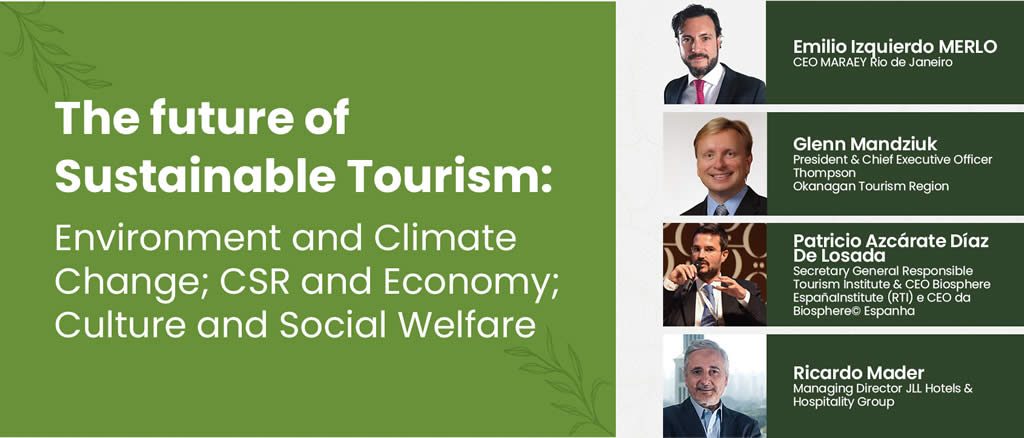
Entity leaders met in a webinar to discuss the importance of environmental, economic and sociocultural balance in the development of tourist destinations
Representatives from tourism sector entities met last Wednesday in a Webinar to debate about the future of sustainable tourism. The meeting was held on the channel created for the MARAEY project, the main touristic-real estate hub in Brazil. Acting as moderator was the General Secretary of the Responsible Tourism Institute (RTI) and CEO of Biosphere Spain, Patricio Azcárate, with the participation of Emilio Izquierdo Merlo, CEO of IDB Brasil (the company responsible for MARAEY), Glenn Mandziuk, President and CEO of Thompson Okanagan Tourism Region (TOTA), and Ricardo Mader, Director of JLL Hotels & Hospitality Group.
Mr. Azcárate opened the debate speaking about the importance of tourist destinations being aligned with sustainability, which is the aim of the Biosphere certification stamp granted by the Responsible Tourism Institute (RTI), the organization that was born in 2017 during International Sustainable Tourism year, after conferences sponsored by UNESCO and the World Tourism Organization. In order to obtain it, it is necessary to work on a series of goals divided in three main areas: environment and climate change, economy, culture and social welfare.
During the debate Mr. Izquierdo Merlo highlighted the significance of being part of the Biosphere community. MARAEY is the first private project in the world to receive this certification in the ‘Tourist Destination’ category. With the stamp, the project reinforces its commitment to following the 17 UN Sustainable Development Goals (SDGs) and the more recent guidelines of the Climate Agreement in Paris.
Mr. Mandziuk talked about the TOTA experience in British Columbia, in Western Canada, with an analysis of the progress made in this region that received Gold Biosphere certification in 2017. He showed how they had built responsible and sustainable tourism on values such as economic growth, dialogue with stakeholders and local communities, joining technology with sustainable tourism and adding value to the local DNA.
In his presentation, he also supported the construction of a development that brings progress for everybody, while respecting the history and tradition of the native communities. He also said that a tourist destination for everybody should involve inclusion and accessibility projects. “When we started the process and talked to the communities, 80% of the income generated by tourism came during the first 45 days of the year. This was in 2012. Something would happen in that period and companies would have to close. We all work with the same purpose, in a huge area, and share common relevant values, both for the local community and for entrepreneurs and visitors. In 2018, we managed to extend that period to 110 days, and now we are determined to achieve 200”, states the executive.
To talk about the future, Emilio Izquierdo showed that MARAEY, developed in a coastal area of 844 hectares with 8.5 kilometers of beaches, will be a totally innovative project that will include Maricá and Rio State in the list of the most important tourist destinations in the world. MARAEY aims to become a worldwide benchmark for sustainability, with a sound environmental, economic and sociocultural balance, incorporating tourism, residential properties, services and the creation of the second largest Reserva Particular do Patrimonio Natural (RPPN) of restinga in Rio State. The project will have a land occupation of barely 6.6%, less than half that permitted in the plans.
“The RPPN will be a natural paradise with permanent protection, open to the public, receiving sustained funding from the project, hotel incomes, companies located in MARAEY and residents in the complex. Sustainable tourism will be fostered by assigning 0.7% of total income from the hotels to environmental, sociocultural and educational sustainability projects”, said the CEO of IDB Brasil. In the construction of an integral sustainable destination, Mr. Izquierdo highlighted the importance of public-private collaboration in the development of the MARAEY Project with the support of the Instituto Estatal de Medio Ambiente (INEA), the Maricá municipality, environmental departments from five universities (UFRJ, UFF, UFRRJ, UFES and FURG), NGOs, architects, engineers and specialists.
The area director of Hotels and Hospitality of JLL Hotels & Hospitality Group, Ricardo Mader, closed the meeting by underlining the importance that sustainability has gained in hospitality in recent years. He said that the increase of travelers has overcrowded big tourist cities – mainly in summer– and because of this there is a significant audience looking for new destinations. MARAEY can provide this as a preferential destination and a highly sustainable project that will become a worldwide benchmark.
MARAEY IS THE FIRST PRIVATE INITIATIVE IN THE WORLD TO BEAR THE BIOSPHERE SUSTAINABLE TOURIST DESTINATION CERTIFICATE

This certification, promoted by UNESCO and the World Tourism Organization, is aligned with the 17 United Nations Sustainable Development Goals and the more recent guidelines of the Climate Agreement in Paris; the list includes destinations all over the world, such as the city of Barcelona in Spain or the Thompson Okanagan region in Canada
The MARAEY project, which will be the first sustainable touristic-real estate development in Brazil, is the first destination in the world to bear the Biosphere stamp as a private initiative. With this certification, the project takes on the commitment to follow the 17 United Nations Sustainable Development Goals (SDGs) and the more recent guidelines of the Climate Agreement in Paris.
The “tourist destinations” category, which includes MARAEY, has only granted the stamp to 41 locations that are committed to promoting sustainable tourism. Among the cities and regions already listed are Barcelona and Tenerife in Spain, Thompson Okanagan in Canada, and Toro in Bolivia.
Developing across an area of 840 hectares in Maricá, only 45 km away from the center of Rio de Janeiro, MARAEY aims to become a worldwide example of sustainability, striking a sound environmental, economic and social balance. As well as tourist services, residential properties and the creation of the second biggest Reserva Particular do Patrimonio Natural (RPPN) of restinga in the Rio State, the project also will include an environmental research center, with the support of renowned academic institutions, such as UFRJ, UFF, UFRRJ, UFES and FURG.
“Obtaining the Biosphere certification is a welcome confirmation that we are on the right track. We are going to carry out a unique project, with a special focus on the environment, social responsibility and local cultural preservation” , highlights Emilio Izquierdo, CEO of IDB Brasil, the company responsible for the development of the MARAEY project.
ABOUT BIOSPHERE
The Biosphere certification is granted by the Responsible Tourism Institute (RTI), an organization that was born from a memorandum of understanding with UNESCO. Obtaining it means following a continued improvement process towards a series of goals divided into three groups in three main areas: environment and climate change, culture and social welfare, and economy. The RTI has the support and the recognition of the World Tourism Organization (OMT), the United Nations program for the environment (UNEP) and other entities.
Gaining this certification means applying the 17 Sustainable Development Goals of the UN 2030 Agenda to tourism based on the work of the Sustainable Development Solutions Network (SDSN) after an analysis carried out by UNESCO and the WTO during the unique world conferences sponsored by United Nations in 2017, the international year of sustainable tourism. It establishes a sector guide for the development of products and services under a new model of non-aggressive tourism that takes into account customer and user needs, without compromising future generations.
For Patricio Azcárate, General Secretary of the RTI, it is an honor to have a Project with such a clear commitment towards sustainability. “MARAEY has become part of the Biosphere revolution for sustainability, involving all participants in the responsible tourism chain: administration, groups, companies, workers, civil servants and tourists,” he says.
The executive director of IDB Brasil, David Galipienzo, highlights that the MARAEY project was designed to preserve all the values of the ecosystems of the Environmental Protection Area (APA) of Maricá. “The environmental, social and cultural heritage of the region is a fundamental component of the project, and our mission is to protect it”, insists Mr. Galipienzo, BSc in Environmental Sciences.
ABOUT MARAEY
The MARAEY project will be developed in Maricá. Under its tourism brand, the project will have four five-star hotels that will receive an average of 300,000 tourists per year, with a luxury eco-boutique resort, a hotel designed to become the most iconic convention complex beside the sea in the country, and the MARAEY Golf Resort with a sustainable 18-hole international golf course.
The project will also offer new dwellings of different kinds (tenements, duplexes and villas) with integrated services such as a school, hospital, shopping and business center, in addition to no end of leisure and sports activities. MARAEY also includes an international hospitality management university with the aiming of putting Maricá on the map as a specialized training hub in Latin America.
With a building occupation rate of barely 6.6% of the land, the project will house the second biggest Reserva Particular do Patrimonio Natural (RPPN) of restinga of the Rio State. The project also includes an environmental research center supported by renowned academic institutions such as UFRJ, UFF, UFRRJ, UFES and FURG.
The forecasted private investment for the Project is R$ 11 billion, with taxes revenues of R$ 7.2 billion during the first 14 years (construction and sales consolidation) plus R$ 1 billion per year during the operation phase. The State of Rio is expected to experience an economic surge with the creation of 36,000 jobs once MARAEY is in full operation.
Close to 200 fishing families in the Zacarias community, inside the project area, stand to gain from the land regulation work, with the properties and definitive deeds being granted to the residents. IDB Brasil will also foster the local culture and fishing, with recovery programs for the Maricá lagoon, the restocking of native species and the rescue and dissemination of the Zacarias Family memory through the creation of the Fisherman’s Craft House.
ABOUT IDB BRASIL
IDB Brasil is the company responsible for the development of the MARAEY Project (maraey.com). It is controlled and managed by Spanish Companies, among them Abacus Property Development and the Cetya Group, who own certifications ISO 9002 and ISO 14001 and have been working in the raw materials, real estate and construction markets for over 50 years, including environmental recovery projects.
The Cetya Group also operates through the Cetya Foundation, assigning 0.7% of the company turnover to the development of sustainable projects in the areas where it works to sponsor sport, cultural and social projects.
MARAEY, A TOURIST AND RESIDENTIAL ECO DEVELOPMENT IN MARICÁ, WILL HOST PROJECTS BY NIEMEYER AND ANOTHER FIVE RENOWNED ARCHITECTURE FIRMS
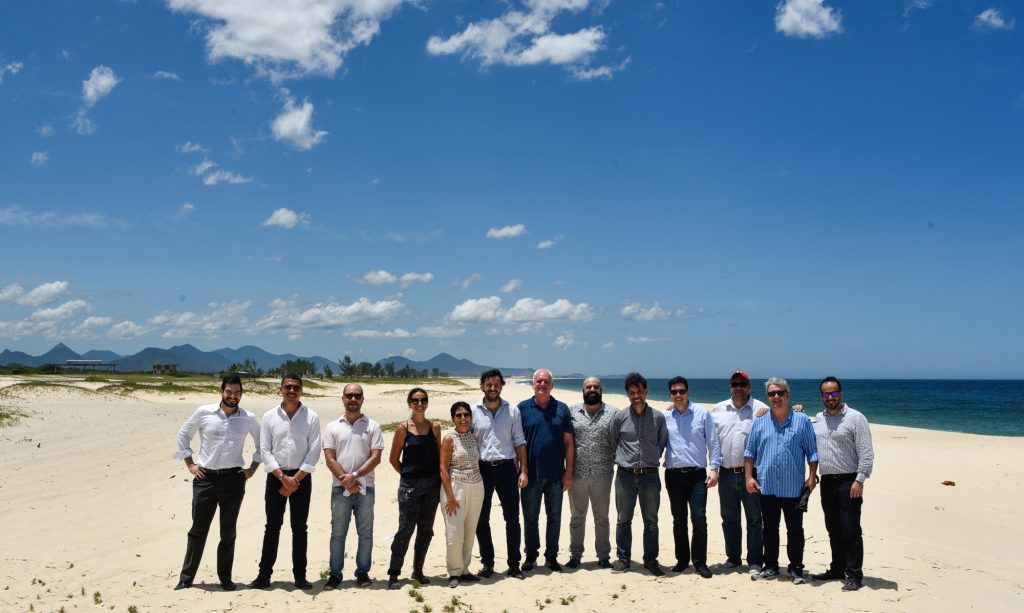
Managers of IDB Brasil on a technical visit with Brazilian and Spanish architects on February 18th to the site where the development will be constructed
IDB Brasil has signed agreements with five renowned Brazilian and international architectural and urban studios. Moreover, the company obtained the assignment of a Niemeyer Project for MARAEY, a cutting-edge sustainable touristic-residential complex licensed to be developed on the coast of Maricá. Coming from Brazil, the studios who have confirmed their participation are Mayerhofer & Toledo Arquitetura and Piratininga Arquitetos Associados. Spanish participating firms are Abacus Property Development, b720 Fermín Vázquez Arquitectos and International Hospitality Projects (IHP). The projects will be backed by the GPO Group.
Niemeyer’s iconic curves will be present in Maraey’s Oceanographic Aquarium project, designed a few years ago by one of the most acclaimed architects in history, who passed away in December 2012. The infrastructure will be developed inside the complex in collaboration with Maricá´s Prefeitura, who will be responsible for construction.
On Tuesday February 18th, the CEO of the Company, Emilio Izquierdo, and the Executive Manager, David Galipienzo, welcomed the representatives of the studios for a technical visit to the 840-hectare development area. During the meeting, the architects were able to see the true scale of the project that is set to include touristic resorts and a range of dwellings, as well as access to educational services, healthcare, shops, sports facilities, leisure and business, for both residents and visitors – all inside one complex.
– “We are very happy to announce these agreements with such outstanding studios in the real estate market. MARAEY is an iconic project and we aim to provide inspiration across Latin America. Having these collaborators with us shows how committed we are in our development to top-quality standards, energy efficiency and innovation,” , explained Emilio Izquierdo, CEO of IDB Brasil.
The studios b720 Fermín Vázquez Arquitectos and Piratininga Arquitetos Associados will be responsible for the architectural design of MARAEY’s residential buildings. The former gained an international award with its project for the building Forma Itaim in São Paulo, and the latter was awarded in Brazil with the project to build apartments for teachers and managers of the Aeronautical Technology Institute, as well as having developed urban projects for Fortaleza and São Paulo. In addition, the development stands to gain from the GPO Group’s expertise in infrastructure and engineering consultancy.
Mayerhofer & Toledo Arquitetura, run by the architects Luiz Carlos Toledo, Luiz Claudio Franco and Lucas Franco, were initially involved in designing the Master Plan of the project, and will now also work on the residential and healthcare areas, as well as planning the urbanization of the Zacarias Community. Some of the most noteworthy projects undertaken by this studio include spearheading the development of the Management Plan of the Rocinha favela, considered a national reference in social housing, which led to the community’s Growth Acceleration Plan; medium and large-scale buildings in various segments across the country, such as the Cidade Nova Convention Centre (SulAmerica) in Rio de Janeiro; and several healthcare units in Vita de Rio and Brasilia, and the Saracuruna and Moacyr Rodrigues do Carmo hospitals in Duque de Caxias.
Abacus Property Development will take care of developing the commercial and educational buildings as a company that specializes in designing and managing touristic and real estate projects, with a portfolio of over 150 projects in 21 countries. Abacus will also design the hotels in collaboration with International Hospitality Projects (IHP) and the hotel chains that will be presented during this year. IHP, with over 40 architectural hotel projects in Spain – highlighting the Gran Hotel Inglés (Madrid) and the Majestic Hotel & Spa (Barcelona) – have developed projects amounting to almost BRL 5 billion.
ABOUT MARAEY
MARAEY, Paraíso na Terra, is an innovative touristic-residential project in Brazil. Covering an area of 840 hectares in Maricá, only 45 km away from the center of Rio de Janeiro, the complex will become a worldwide example of environmental, economic and social sustainability.
Regarding the touristic side of the project, MARAEY will have four 5-star hotels welcoming an average of 300 thousand tourists per year. One of the confirmed projects will be the Rock in Rio MARAEY Resort, the world’s first themed hotel under the brand of the festival, where visitors will enjoy the best musical and leisure experiences right on the sea front. Other names will be announced during 2020 to reveal who will be taking care of the luxury resort eco-boutique, a hotel designed to be the most iconic convention resort by the sea, and the MARAEY Golf Resort with an 18-hole golf course of international standing.
The project will also involve a variety of new dwellings (multi-family buildings, duplexes and villas) with integrated services such as a school, hospital, commercial center and offices, in addition to a whole host of leisure activities. MARAEY will also have its own hospitality university of international standing with the aim of turning Maricá into a specialized training hub in Latin America.
With a building occupancy of only 6.6% of the land, the development is set to house the second largest Private Natural Heritage Reserve of restinga vegetation in the State of Rio, as well as including an environmental research center supported by academic institutions such as UFRJ, UFF, UFES and UFRRJ.
The estimated private investment stands at around BRL 11 billion, with an estimated tax generation of BRL 7.2 billion during construction and over BRL 1 billion once in operation, not to mention the 36,000 direct and indirect jobs that will be created when the complex is up and running.
There are almost 200 fishing families living in the Zacarias Community, inside the development area. These families will be protected by the fundiária regulation and will be granted deeds of ownership of their dwellings. Moreover, the community will receive improvements in urban infrastructures similar to the rest of the development, such as sanitation with tertiary technology, road urbanization and underground electricity.
IDB Brasil will also foster the local culture and fishing tradition by implementing recovery programs for the Maricá lagoon, restoring native species, and retrieving the family memory of the Zacarias Community through the creation of the Fisherman’s Craft House.
ABOUT IDB BRASIL
IDB Brasil is the company responsible for the development of the MARAEY project (maraey.com). It is controlled and managed by Spanish Companies, including Abacus Property Development and Grupo Cetya, certified by ISO standards 9002 and 14001, boasting over 50 years of expertise in the raw materials, construction and real estate markets and experience in environmental recovery projects.
Grupo Cetya also works through the Cetya Foundation dedicating 0.7% of the company’s income to developing sustainable projects in the areas where it operates, sponsoring sport, cultural and social projects.
HOW DOES THE WORLD SEE THE RIO DE JANEIRO’S TOURISM POTENTIAL?
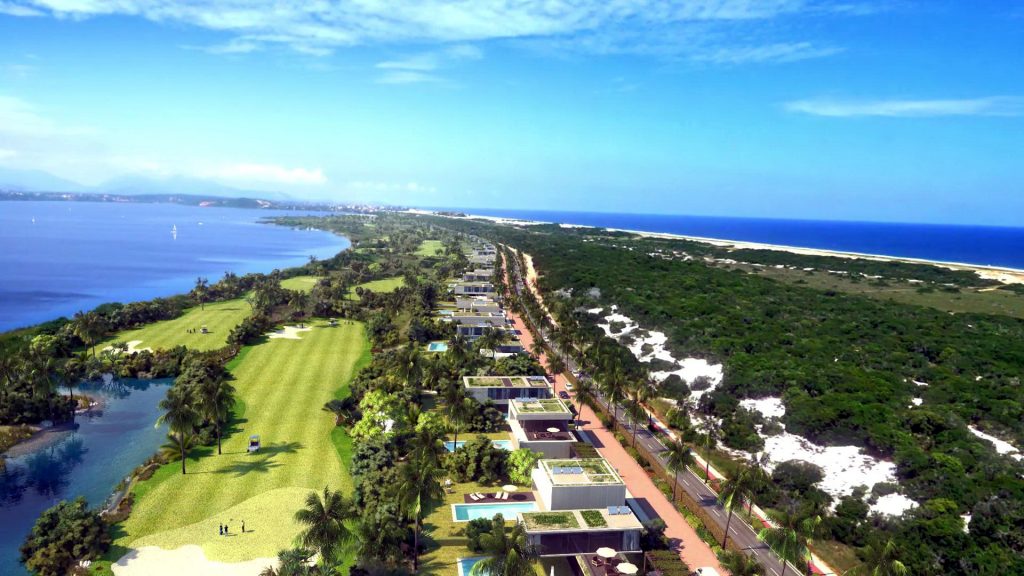
The whole world knows Rio de Janeiro, either because they have visited the Cidade Maravilhosa or because they have an idealized concept in their heads. Among those who have already visited the city, 95% intend to go back, and those who do not know the city are keen to enjoy the landscapes, the joy of the people, the culture and the tourist icons, such as the Corcovado, the Sugar Loaf and the Ipanema and Copacabana beaches, among other attractions. Rio de Janeiro offers an unforgettable experience for visitors and a strong international brand that needs a small boost in order to improve tourism ratios and honor its potential. The same can be said of the Brazil brand. As an illustrative comparison, Madrid received 7,6 million international tourists in 2018, while Rio received 1,3 million; and Spain received 83,7 million in the same period, while Brazil received 6,6 million. These differences show Brazil’s huge improvement potential.
I was born in Spain, and I was always passionate about Rio de Janeiro. I consider myself a Carioca at heart and a lucky person because now, through the MARAEY Project, I have the opportunity to offer a new tourist destination concept in Brazil, in Maricá city, inside the Rio de Janeiro metropolitan area, that is sure to catalyze the potential of this huge state and national tourism.

WHAT WILL THE MARAEY PROYECT LOOK LIKE?
MARAEY will be the most important touristic-residential development in Latin America and an international benchmark in sustainable development. This statement may seem daring, but I have spent my whole life working in big real estate projects, studying the main tourist destinations in the region in detail, and I am completely convinced that there is no other project with the unique features that MARAEY has.
Firstly, I have to mention the area, which is located just to 45 km from the center of Rio de Janeiro, comprising 840 hectares, between the sea and the Maricá lagoon, with 8,5 km of oceanic coast and 12,5 km of lagoon coast.
Within that unique setting, we are going to consolidate a new international tourist hub, less than one hour’s drive from the international and national airports of Rio de Janeiro; and we also have the local Maricá airport. There will be four five-star hotels (Rock Rio MARAEY Resort, MARAEY Golf Resort, MARAEY Convention Resort e Eco Boutique MARAEY Resort) with value proposals and complementary experiences, in addition to an International Hospitality Management University and a Professional Training Center.
From a residential point of view, MARAEY will become an exclusive and iconic tourist destination in the country, offered to buyers of first and second residences. Our development is located in Maricá, a municipality with 161,000 inhabitants. It is the first holder of oil and gas royalties in Brazil, investing in infrastructures, education, health and tourism. We are also close to Rio de Janeiro and other cities with significant population density, at an optimal distance from the influence area of the main industrial investments of the country. In Maricá, we will offer a residential and service proposal the likes of which has never seen before: with apartments, duplexes and villas, malls, business centers, hospitals, schools, golf courses and an international equestrian center, fulfilling the highest standards of quality, design, innovation and energy efficiency.
The design and consolidation of MARAEY as the most important touristic and residential Project in Latin America will be carried out with the utmost respect for environmental sustainability standards, guaranteeing a preserved area of 81%, the creation of the second biggest RPPN (Reserva Particular do Patrimônio Natural) of Restinga in the Rio de Janeiro state, where the building occupancy will be barely 6.6% of the total area. At this point, another essential factor is the presence of the MARAEY institute, with the participation of several universities – such as UFRJ, UFF, UFES and UFRRJ – in order to research and study these ecosystems.
Finally, our initiative aims to foster local communities through the cultural and social development of the region, signing an initial pledge of extreme importance for the regularization of the Zacarias Fishermen Community lands, giving the property deeds to close to 200 families that today live in the area. Moreover, with a range of future properties, the dwellers will benefit from the general services (paving, water, electricity, etc.) provided in the project.
All this effort will mean a major economic development for Maricá. We estimate that MARAEY will foster the economy creating 36,000 new jobs and R$ 1 billion in taxes per year, once the complex is working. More than just an innovative business model, MARAEY will be a big opportunity for growth in the local community.
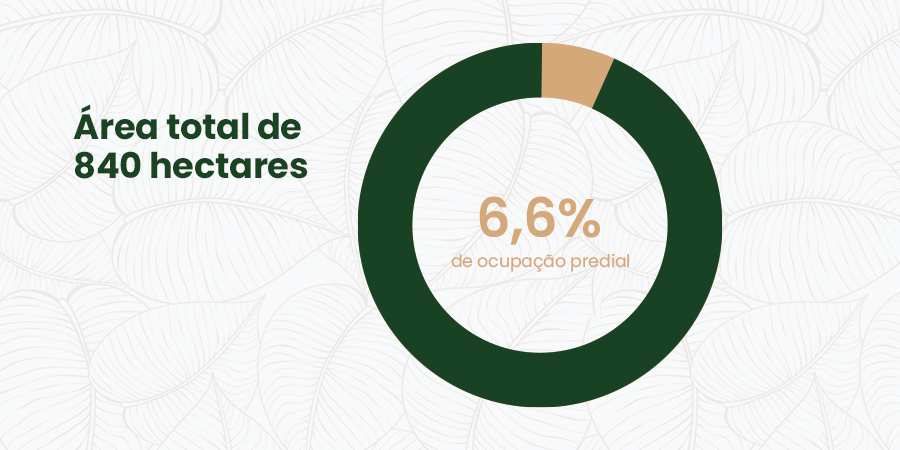
WHAT IS OUR PURPOSE WITH MARAEY?
Essentially, we have the mission of transforming MARAEY into the most iconic touristic and residential development in Latin America – a worldwide benchmark for environmental preservation, economic impact and integration in the local communities.
And our mission comprises several main objectives and pillars: 1) Sustainability and energy efficiency by applying architectural models of low impact and density, using eco-friendly materials, the MARAEY Institute, together with the main academic institutions in the country, will carry out researches on the area’s ecosystems. 2) Innovation and implementation of new technologies in order to be at the forefront and attract Companies and partners who share our principles and exemplariness. 3) Promoting integral, top-quality specialized education in order to transform society through the main change vector and turn Maricá into a high-level hospitality training hub. 4) Including the local and regional communities, enhancing their culture, their traditions, and also offering new quality jobs and future perspectives through important investments. 5) Quality and exclusivity, increasing the exclusive residential and services offering in the region, because there is nothing at all like it for the surrounding society.
INNOVATION AND SUSTAINABILITY FOR TRANSFORMATION
Through the Smart City philosophy, we intend to leave a transformation legacy based on the intelligent use and sustainability of the land. With efficient buildings and initiatives that balance natural resources, we aim to minimize our impact on the environment. In order to reach that goal, we will have a system of local transport that will use the electric model, decreasing the amount of contaminating emissions in the air. For this, MARAEY will have several of electrical connection points.
Maricá will be boosted by the MARAEY project. We are going to transform it into the Maricá of the future, an innovative city and pioneer in technology. My particular mission in the MARAEY Project is to become an example of Brazilian economic, social and environmental sustainability.
Emilio Izquierdo Merlo. CEO IDB Brasil (the company responsible for the development of the MARAEY project)
MARAEY GOLF RESORT WILL POSITION MARICÁ ON THE WORLD SPORT SCENE
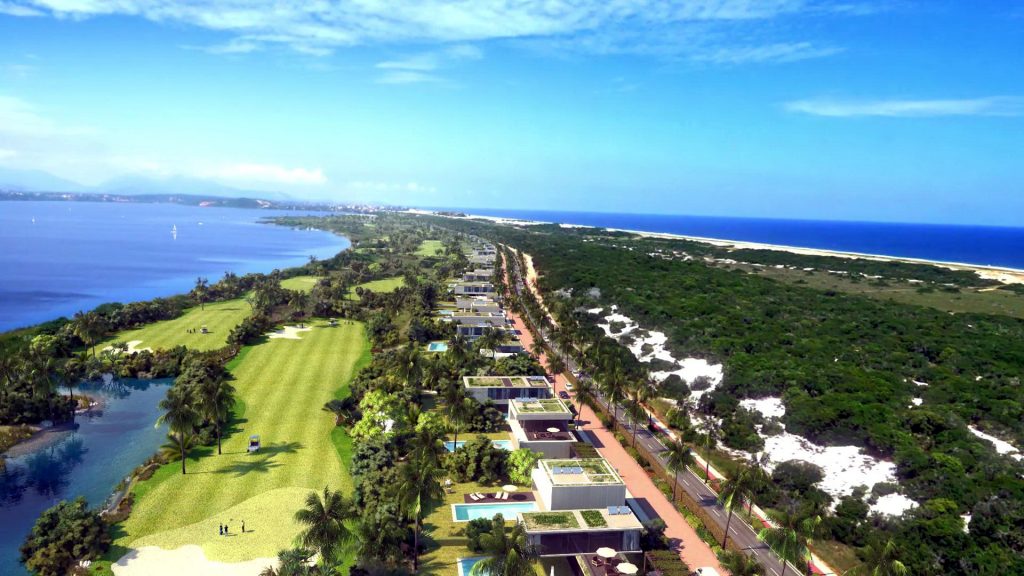
In addition to the 18-hole golf course complying with international standards open to the public, the touristic-residential complex will have an equestrian center.
MARAEY, one of the most important residential-touristic complexes in Latin America, will transform Maricá, on the coast of the Rio de Janeiro State, not only into a tourism hub, but also into one of the top locations in the worldwide golfing scene. One of the four five-star hotels in the development will be the MARAEY Golf Resort, featuring an 18-hole golf course covering 70 hectares, fulfilling all the specifications to host official international competitions.
The resort, the golf course and the villas (high-standing exclusive houses linked to the hotel) are located overlooking the Lagoon of Maricá, one of the most beautiful landscapes in the State of Rio. Moreover, it is all set inside MARAEY, a complex covering 840 hectares with less than 6.6% of building area, which is the second-biggest Private Natural Heritage Reserve (RPPN) of restinga in the State. This is where sport, comfort and nature converge.
THE GOLF COURSE WILL BE SUSTAINABLE AND INCLUSIVE
The total distance of the course will be 6,400 m, with 18 holes and par 72 – in golf, overall “par” means the ideal number of strokes in each course from the tee (start) until the final hole. These 18 holes are distributed in the following way: four short holes (par 3) from 130 to 220 m, ten short holes (par 4) from 220 to 450 m, and four short holes (par 5) over 450 m. The course is composed of two parts with nine holes each, allowing golfers to play a full course or only nine holes.
As with everything in MARAEY, the golf course is fully sustainable, featuring the least possible turf area to preserve the landscape of the restinga’s natural vegetation, which will occupy 72% of the area. Irrigation will be done with clean water thanks to the modern treatment facilities used in the sanitation system of the hotels and accommodation. Another important feature is the openness of the course, as pointed out by David Galipienzo, executive director of IDB Brasil, the company responsible for MARAEY.
– “Most courses only allow members and guests to play. MARAEY will be different. In addition to the guests at the hotel and the residents in the villas, anyone with a ticket will be able to use the course. Our goal is to boost this sport in Brazil” – says Mr. Galipienzo.
In order to foster golf, MARAEY Golf Resort will also have a golf school and offices for players. The course, the resort and the villas are part of the first phase of the development, as well as the Rock in Rio MARAEY Resort, the first hotel featuring the brand of one of the most important musical festivals in the world. Work is set to start in the first semester of 2021.
THE EQUESTRIAN CENTER WILL HAVE AN INDOOR TRACK AND LESSONS
Golf will not be the only Olympic sport at MARAEY. The complex will also have an equestrian center fulfilling the standards of the International Federation for Equestrian Sports (FEI) and the Brazilian Equestrian Confederation (CBH). Facilities will include an indoor track, two grass tracks and two sand tracks, a veterinary clinic, and a riding school, in addition to shops and restaurants.
ABOUT MARAEY
With the Maricá Lagoon on one side and 8.5 kilometers of virgin beaches on the other, MARAEY is a paradise where technology, comfort and respect for nature converge. There will be four five-star resorts: Rock in Rio MARAEY Resort, MARAEY Golf Resort, an events resort, and an eco-friendly boutique hotel beside the Nature Reserve. In addition to houses and a regulated and urban traditional fishing community, the complex will include a hospitality university, shopping centers, schools and a technological hub. The Nature Reserve will have a Research Center, in collaboration with the UFRJ, UFF and UFRRJ, where researchers will work to protect endangered species.
ABOUT IDB BRASIL
IDB Brasil is the company created to develop the MARAEY project. It is controlled and managed by Spanish companies, including Abacus Property Development and Cetya Group, boasting certifications ISO 9002 and ISO 14001, having worked for more than 50 years in the global construction market, with various projects involving environmental recovery.
Cetya Group also includes the Cetya Foundation, investing 0.7% of company turnover in the development of sustainable projects in places where it has business, sponsoring sportive, cultural and social projects.
THE ROCK IN RIO MARAEY RESORT IS LAUNCHED ON THE SECOND DAY OF THE FESTIVAL
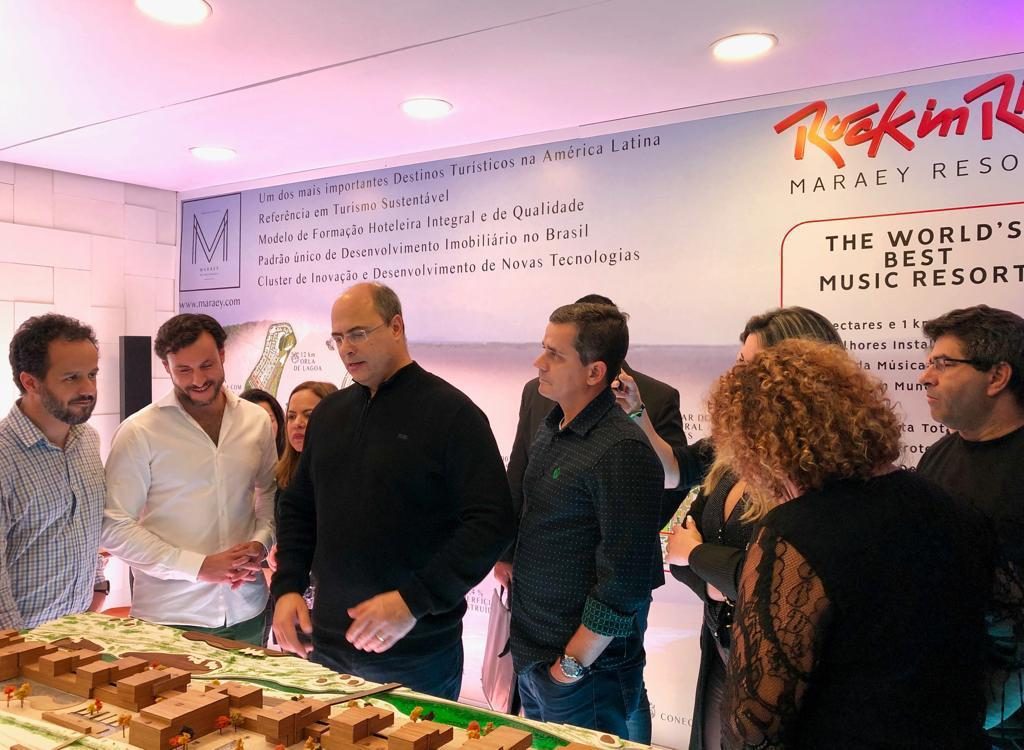
Attending the event were the vice-president of Rock in Rio, Roberta Medina, and the executive president of IDB Brasil, Emilio Izquierdo Merlo. The Project will be part of MARAEY, one of the biggest sustainable residential-touristic complexes in the country
The ultimate musical experience in a sustainable paradise only 45 km away from the center of Rio de Janeiro. This is the mission of the Rock in Rio MARAEY Resort – the first themed hotel in the world under the brand of the festival. The development was officially announced this Saturday by the vice-president of Rock in Rio, Roberta Medina, and by Emilio Izquierdo Merlo, executive president of IDB Brasil as the company responsible for MARAEY, which is set to be one of the biggest touristic-residential complexes in Brazil covering 840 hectares of land with a building occupancy of less than 6.6%
The construction of the Rock in Rio MARAEY Resort – one of the four planned hotels in the region – is scheduled to start during the first semester of 2021 and to begin operations two years later. Emilio Izquierdo Merlo was pleased to formalize the agreement with the biggest and best music festival brand in the world:
– “The presence of MARAEY here today, together with the Rock in Rio brand, with whom we are aligned in our values of innovation, sustainability and social responsibility, is the beginning of a dream we have pursued for a long time. We will be giving Maricá and the State of Rio the most innovative and sustainable tourism hub in the country, with full support from public, academic and private institutions” – explained the executive-president of IDB Brasil.
For Roberta Medina, the Rock in Rio MARAEY Resort is an important point of contact between the brand and its audience.
– “We want to do much more than hold a festival every two years and launch some actions on social media. To be able to materialize the brand values in this new context is highly positive for Rock in Rio” – stated the vice-president of the festival.
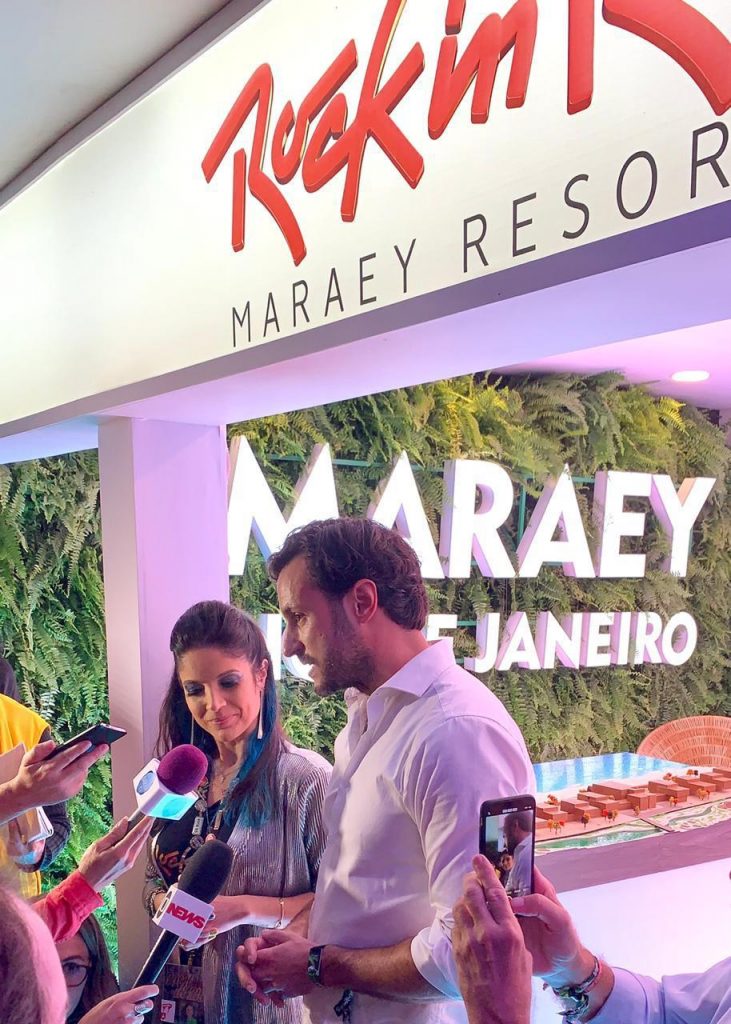
R$ 11 BILLION IN PRIVATE INVESTMENT, R$ 7.2 BILLION PER YEAR IN TAXES
Located on the coast of the Municipality of Maricá, the MARAEY complex will involve a private investment of R$ 11 billion in 14 years, generating R$ 7.2 billion in taxes per year during construction, plus R$ 1 billion per year during operation. The works of the whole complex, lasting an estimated 14 years, will generate up to 52,000 direct jobs. Once running, MARAEY will create 36,000 direct and indirect jobs per year.
In addition to four five-star hotels and residential areas, the complex will have the second-largest Private Natural Heritage Reserve (RPPN) of restinga in the State of Rio covering 437 hectares. The reserve will house a flora and fauna Research Center, supported by researchers from universities such as UFRJ, UFF and UFRRJ.
The Rock in Rio MARAEY Resort will donate 0.7% of turnover to environmental protection, educational and social development projects.
The Governor of the State of Rio de Janeiro, Wilson Witzel, also visited the MARAEY stand at Rock in Rio and confirmed his support for the Project, saying:
– “I have been delighted with the Project from the very beginning. It will bring over 300,000 tourists per year, which is really fantastic. You can rely on the full support of the State of Rio.” – says the Governor.
The MARAEY complex understands the environmental heritage and the culture of the local population as essential values in the development. The project plans to urbanize and drive the cadastral regularization of the Zacarias fishing community, whose 200 families will receive ownership deeds and gain from infrastructure works with the same characteristic as the rest of the complex.
– “The development is defined by environmental and social values. The community and its surroundings will be supported with a cultural memory recovery program, a Maricá Lagoon revitalization program and a program to repopulate native species. We are going to construct the Fisherman’s Craft House to display the history and local culture, and will work to guarantee that fishing continues” – said the executive director of IDB Brasil, David Galipienzo.
For the Mayor of Maricá, Fabiano Taques Horta, the development can change the profile of the city and become a strong driver of development in the State.
– “We live according to the oil cycle. MARAEY will bring the tourism cycle to Maricá, with benefits for the whole population and the local and State economy”.
In order to train its workforce, MARAEY will house a hospitality university within the complex managed by one of the most prestigious schools in the world, to be announced shortly.
ABOUT IDB BRASIL
IDB Brasil is the company created to develop the MARAEY project. It is controlled and managed by Spanish companies, including Abacus Property Development and Cetya Group, boasting certifications ISO 9002 and ISO 14001, having worked for more than 50 years in the global construction market, with various projects involving environmental recovery.
Cetya Group also includes the Cetya Foundation, investing 0.7% of company turnover in the development of sustainable projects in places where it has business, sponsoring sportive, cultural and social projects.
THE STATE ENVIRONMENTAL CONTROL COMMISSION (CECA) REVALIDATES THE ENVIRONMENTAL LICENSE OF THE MARAEY TOURISTIC-RESIDENTIAL DEVELOPMENT IN MARICÁ
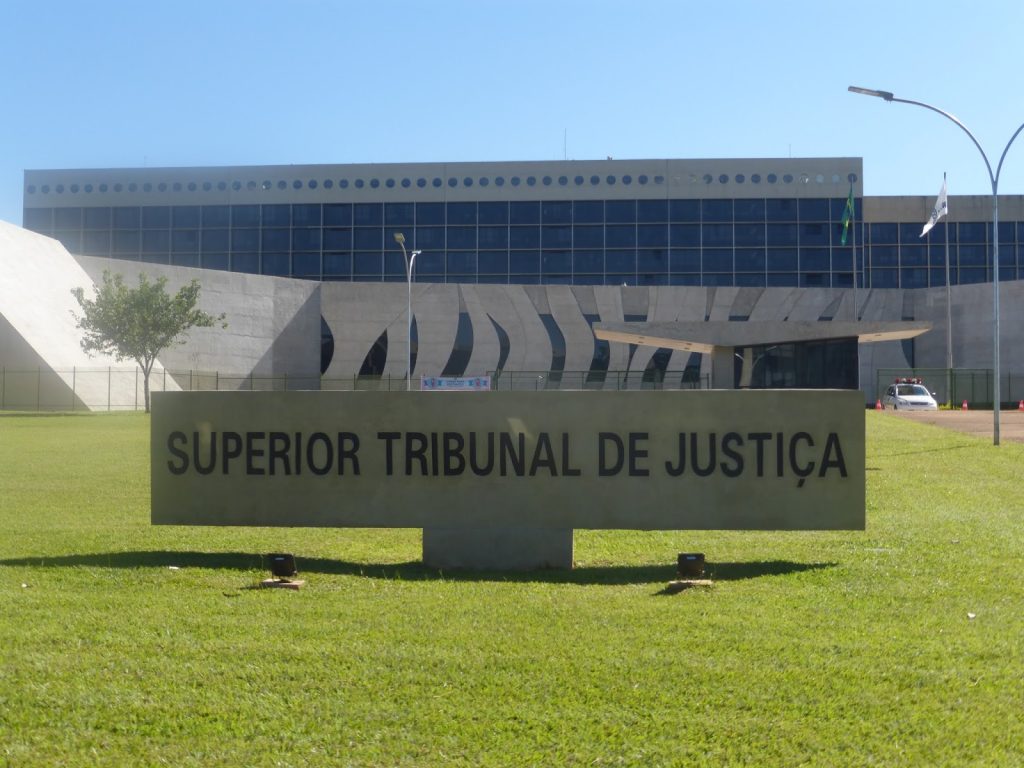
The decision was made after the Supreme Court of Justice lifted the precautionary measure that prohibited the license of the project. The company will apply for the Construction License in the coming weeks in order to start work in early 2020.
This Tuesday (September 24th) the National Environmental Control Commission (CECA) has renewed the environmental license (LP) of the MARAEY project, a sustainable touristic residential project carried out by IDB Brasil in an area covering 840 hectares in Maricá, with less than 6.6% building occupancy. Linked with the State Environmental Secretariat, the CECA is the official body in charge of coordinating, supervising and controlling a rational use of the environment in the State of Rio.
The renewal took place after the President of the Supreme Court of Justice, Minister João Otávio de Noronha, agreed with the request of the Municipality of Maricá to lift the precautionary measure imposed by the Court of Justice that prohibited the license of the project. According to Mr. Otávio, “the indefinite paralysis of the administrative action, consequently preventing the implementation of projects able to generate a positive impact on the local economy and on the sustainable development of the area, induces serious damages to the public economy”.
In the coming weeks, IDB Brasil will apply for the Construction License authorizing the start of the works, estimated for the beginning of 2020.
For the executive director of IDB Brasil, David Galipienzo, the renewal of the license is a victory for sustainable development:
– “The decision of the CECA confirms that our project not only fully complies with the Law, it also proposes important solutions in terms of sustainability. Its impact will be positive in several ways. I am convinced that we will become a benchmark for new sustainable projects in Rio de Janeiro”.
ABOUT MARAEY
The MARAEY Project, set in a touristic-residential complex with important sustainability features, has been developed in an area of 840 hectares in Maricá, with a buildability of less than 6.6% of the land. The development involves creating the second-largest Private Natural Heritage Reserve (RPPN) of restinga in the State of Rio, in addition to an environmental research center, with the support of academic institutions such as UFRJ, UFF and UFRRJ, helping to further research about local flora and fauna.
Close to 200 fishing families that live in the Zacarias community, inside the development area, will benefit from the cadastral regularization, which includes granting definitive property deeds for residents. Moreover, the community will see improvements in urban infrastructures matching those of the development, such as sanitation with tertiary technology, roads, urbanization and underground power lines. In addition, IDB will foster the local culture and fishing, including plans for the recovery for the Maricá Lagoon, repopulation of native species and recovery and dissemination of the family history of Zacarias through the creation of the Fisherman’s Craft House.
The project also features four five-stars hotels, a golf course, an equestrian center, and a tourism and hospitality university, in addition to shops and other services. The estimated private investment stands at around R$ 11 billion, with a generation of taxes of R$ 7.2 billion during construction, plus over R$ 1 million per year once in operation, not to mention the 52,000 direct jobs in the construction phase, and 36,000 direct and indirect jobs per year once the complex is up and running.
ABOUT IDB BRASIL
IDB Brasil is the company created to develop the MARAEY project. It is controlled and managed by Spanish companies, including Abacus Property Development and Cetya Group, boasting certifications ISO 9002 and ISO 14001, having worked for more than 50 years in the global construction market, with various projects involving environmental recovery.
Cetya Group also includes the Cetya Foundation, investing 0.7% of company turnover in the development of sustainable projects in places where it has business, sponsoring sportive, cultural and social projects.
MARAEY: R$ 11 BILLION IN PRIVATE INVESTMENTS, R$ 7,2 BILLION IN TAXES AND THE SECOND-BIGGEST RESTINGA RESERVE IN THE STATE
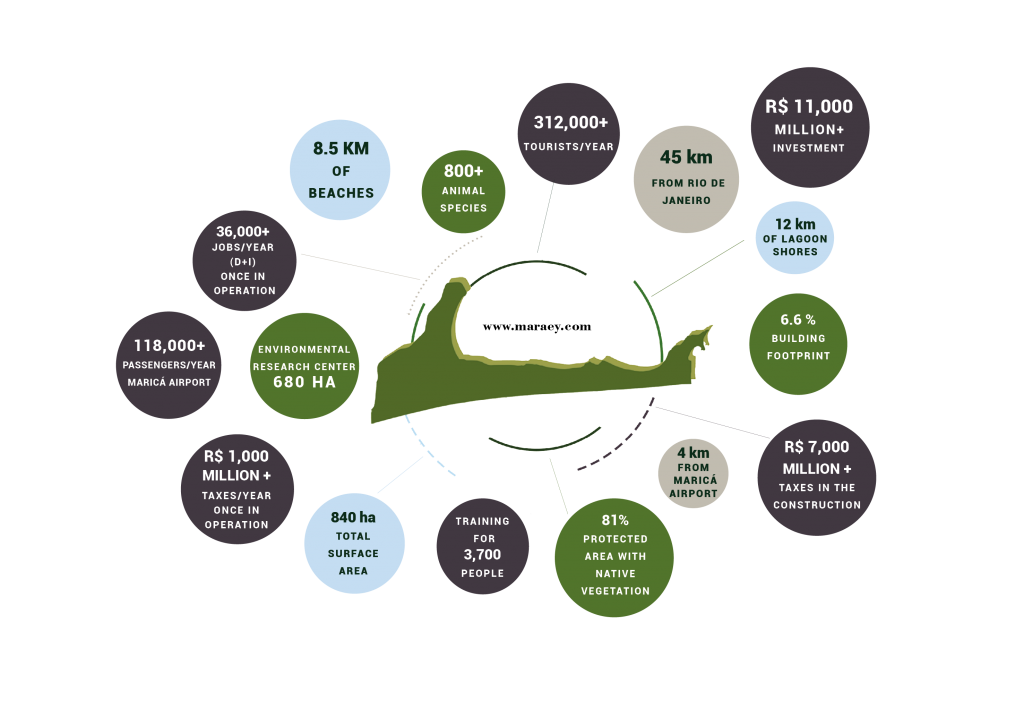
The sustainable residential-touristic complex will have four hotels, including the first themed resort under the Rock in Rio brand and an environmental research center backed by institutions such as UFRJ, UFF and UFRRJ
The State of Rio will be home to one of the most important touristic-residential developments in the country: MARAEY, developed by the company IDB Brasil with over R$ 11 billion of private investment, four five-star hotels, including the first themed resort under the Rock in Rio brand, and residential condominiums. The project will generate R$ 7.2 billion in taxes for the Brazilian treasury during the 14-year construction period, and over R$ 1 billion per year whilst in operation. The outlook is a significant improvement in the economy of the State of Rio, generating up to 52,000 direct jobs during the works, and 36,000 direct and indirect per year once it is up and running. The MARAEY project is located in a beautiful coastal area covering 840 hectares with 8.5 km of beaches in the municipality of Maricá, just 45 km away from the center of Rio.
The economic impact of the development has been assessed in a number of studies by Abacus, a company linked to the Project, commissioned by IDB Brasil.
the report shows the construction expenses of the project totaling R$ 11.2 billion were broken down to show that the most important items are the complete urbanization of the development and the residential infrastructure, accounting for close to R$ 8.5 billion, and the hotels, costing roughly R$ 1.8 billion.
The report also showed that the Brazilian government will collect R$ 6.22 billion in direct taxes and R$ 1.1 billion in indirect taxes during the construction and consolidation of the development, which is estimated to be completed in 14 years.
The number of jobs involved in the project during the construction phase was calculated based on the indicators of the Câmara Brasileira da Indústria da Construção (CBIC) of the Fundação Getúlio Vargas. During the 14 estimated years of works, 52,000 direct jobs will be generated. During operation, the forecast is 36,000 jobs per year: 18,000 direct and 18,000 indirect or induced.
The percentage of direct jobs during operation will be: 26.16% in hotels, 39.39% in commerce and services, and 34.45% in the residential sector. Over 40% of jobs will target professionals with technical qualifications and higher education. Furthermore, regional residents will be employed preferentially.
The annual turnover obtained from accommodation at the four hotels in the complex when operation begins is calculated at R$ 1.3 billion. It is estimated that around 4,730 direct jobs will be created at the hotels alone.
– “We are sure that Rio de Janeiro’s enormous touristic potential is not being fulfilled. Moreover, the entire hospitality infrastructure inside the Metropolitan Area is urban. With the construction of four luxury resorts in an idyllic location just 45 km away from the national airport (Santos Dumont) and international airport (Tom Jobim), we are going to make an incomparable contribution to the economic and touristic development of the whole State” – explains Emilio Izquierdo Merlo, executive president of IDB Brasil
A COMBINATION OF SHEER LUXURY AND STRICT SUSTAINABILITY STANDARDS
MARAEY is not all about high-level tourism and accommodation. Located in the Environmental Protection Area (APA) of Maricá, which is a preserved area for sustainable use, the development will have a building area of just 6.6% – half the maximum allowed in the Management Plan issued for the region. The core assets of the project will be environmental protection, the re-valuation of the local fishing community of Zacarias, and investments in education and research in collaboration with some of the main academic institutions in the State.
The four MARAEY hotels will total two thousand rooms to host an average of 312,000 tourists per year. One of them will be the first Rock in Rio brand hotel, where guests will enjoy the best musical and entertainment experiences overlooking a spectacular beach of fine sand. This hotel will show a unique level of engagement and awareness through several actions, such as allocating 0.7% of overall turnover to sustainable projects (environmental, socio-cultural and education) and to the Rock in Rio Volunteer community. Three more international brands will be announced in the coming months. The brands will run an eco-boutique hotel inside the Private Natural Heritage Reserve (RPPN), a luxury hotel designed to be an important events center in Latin America, and an international resort around an 18-hole golf course.
MARAEY is not only a place for visitors. The development will include 7,000 new homes of different kinds: condos, duplexes, detached homes and villas. The residential buildings will have a maximum of four floors to blend into the environment in a non-invasive way. Residents and visitors will have access to the educational, healthcare, commerce, sports, leisure, and business services inside the development. MARAEY also will guarantee top security for the area, including the Zacarias community.
The MARAEY philosophy is that of a Smart City implementing information and communication technologies. Intelligent buildings and initiatives for the sustainable use of natural resources so as to lessen its impact on the environment. The local transportation system will be electric, reducing the amount of emissions released into the atmosphere. Moreover, the complex will feature a great many power charging points.
ENVIRONMENTAL ENGAGEMENT AND TRAINING
Covering 8.5 km of beaches and 12 km of the Maricá Lagoon coast, the development area is paradise. Sadly, however, it has been suffering gradual degradation due to contamination in the lagoon and people illegally collecting sand and wood, as well as other environmental damage. The works for the environmental control and recovery of the degraded areas will be the core policy of the development. For example, the creation of a Nature Reserve to protect the restinga, the second-biggest RPPN in the Rio State, illustrates the responsibility of the project towards the comprehensive and constant preservation of the area and the commitment to manage it accordingly.
The total surface area of the development spans 840 hectares, only 6.6% of which will be built on by the end of the MARAEY construction. Apart from specific areas such as roads, paths, gardens and the existing area of Zacarias, 81% of the surface will be preserved or restored in order to protect the native vegetation.
Some of the most important research and educational institutions in the country such as UFRJ, UERJ, UFF, UFRRJ, UFES and FURG will be part of the MARAEY research center. This institution will focus on studying and researching the restinga flora and fauna as well as other ecosystems in the region.
All of the sanitation of the complex, including the Zacarias community, will receive tertiary treatment, the most modern in the world, as a guarantee that contamination will not be discharged in the sea or the lagoon. The treated waters will be transformed into reusable waters to irrigate the golf course and the gardens.
LOCAL COMMUNITY: DEED OF OWNERSHIP AND CULTURAL PRESERVATION
Social responsibility is one of the key pillars in the project. The Zacarias fishing community comprising some 200 families who currently live in legally precarious conditions will be benefited by a cadastral regularization process in the first phase of the Project, granting residents a definitive deed of ownership.
The community will gain from improvements in urban infrastructures, such as sanitation and road paving with the same characteristics as the rest of the development.
The tradition and culture of the community will be supported through important actions such as the creation of the Fisherman’s Craft House showing the history of their fishing activity and technical support to guarantee its continuity, along with a program to restore and disseminate the family memory of Zacarias. Fishing will be encouraged by a Maricá Lagoon recuperation program and the repopulation of native species.
– “The development is defined by environmental and social values. The community and its surroundings will be supported with a cultural memory recovery program, a Maricá Lagoon revitalization program and a program to repopulate native species. We are going to construct the Fisherman’s Craft House to display the history and local culture, and will work to guarantee that fishing continues” – said the executive director of IDB Brasil, David Galipienzo.
EDUCATION AND TRAINING
The outlook for the creation of 18,000 direct jobs once MARAEY is in operation creates a huge demand for qualified workers in the tourism and service areas. In order to cover this necessity, the MARAEY University Campus will be created inside the development, led by one of the most acclaimed hospitality schools in the world, whose name will be announced in the coming months, with a capacity for 700 higher education students. Furthermore, with the creation of the Hospitality Training Center of Maricá for 3,000 intermediate-level students by the municipal council, the city will become a hub for training and service excellence, for technical and advanced qualifications.
ABOUT IDB BRASIL
IDB Brasil is the company created to develop the MARAEY project. It is controlled and managed by Spanish companies, including Abacus Property Development and Cetya Group, boasting certifications ISO 9002 and ISO 14001, having worked for more than 50 years in the global construction market, with various projects involving environmental recovery.
Cetya Group also includes the Cetya Foundation, investing 0.7% of company turnover in the development of sustainable projects in places where it has business, sponsoring sportive, cultural and social projects.

